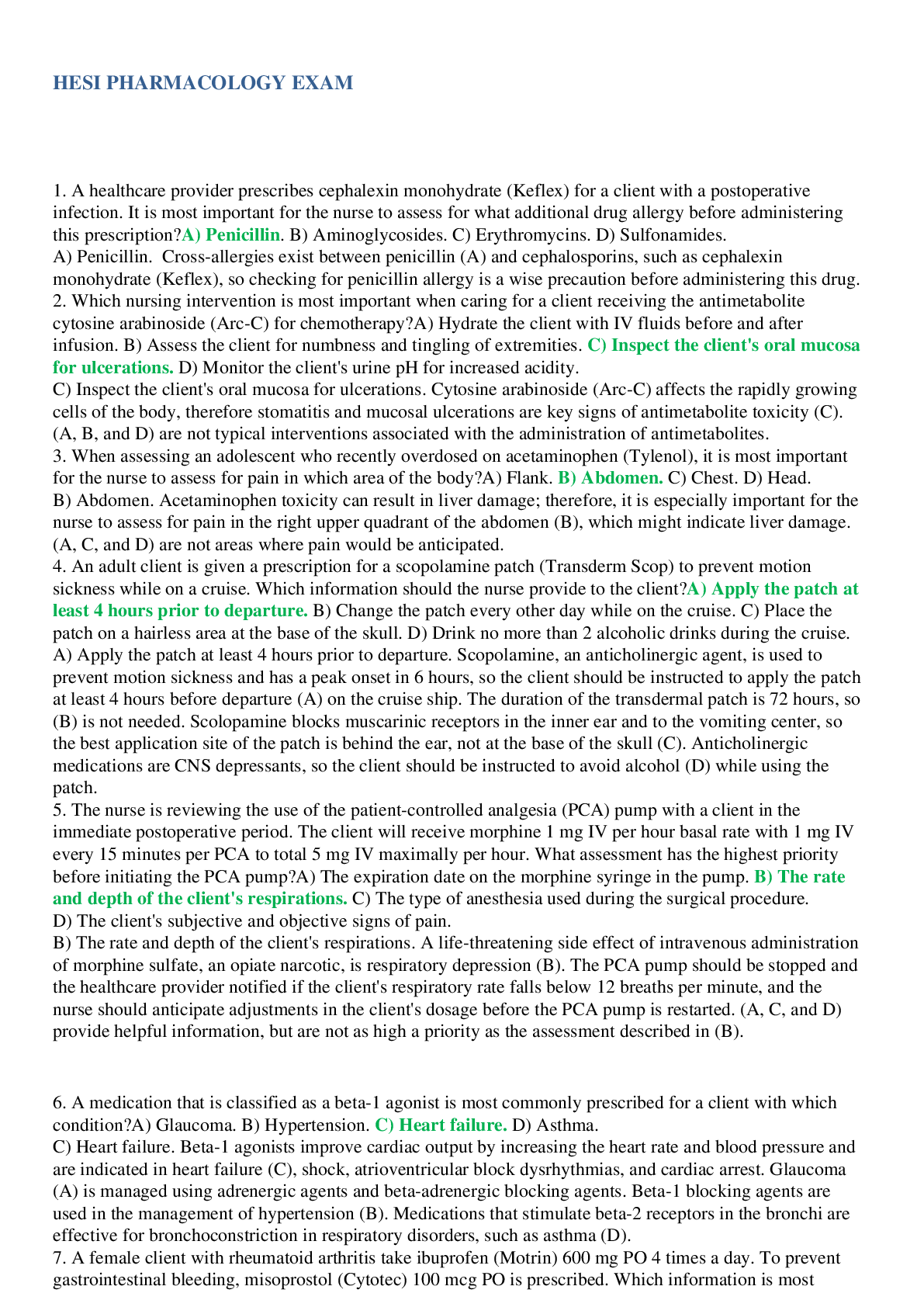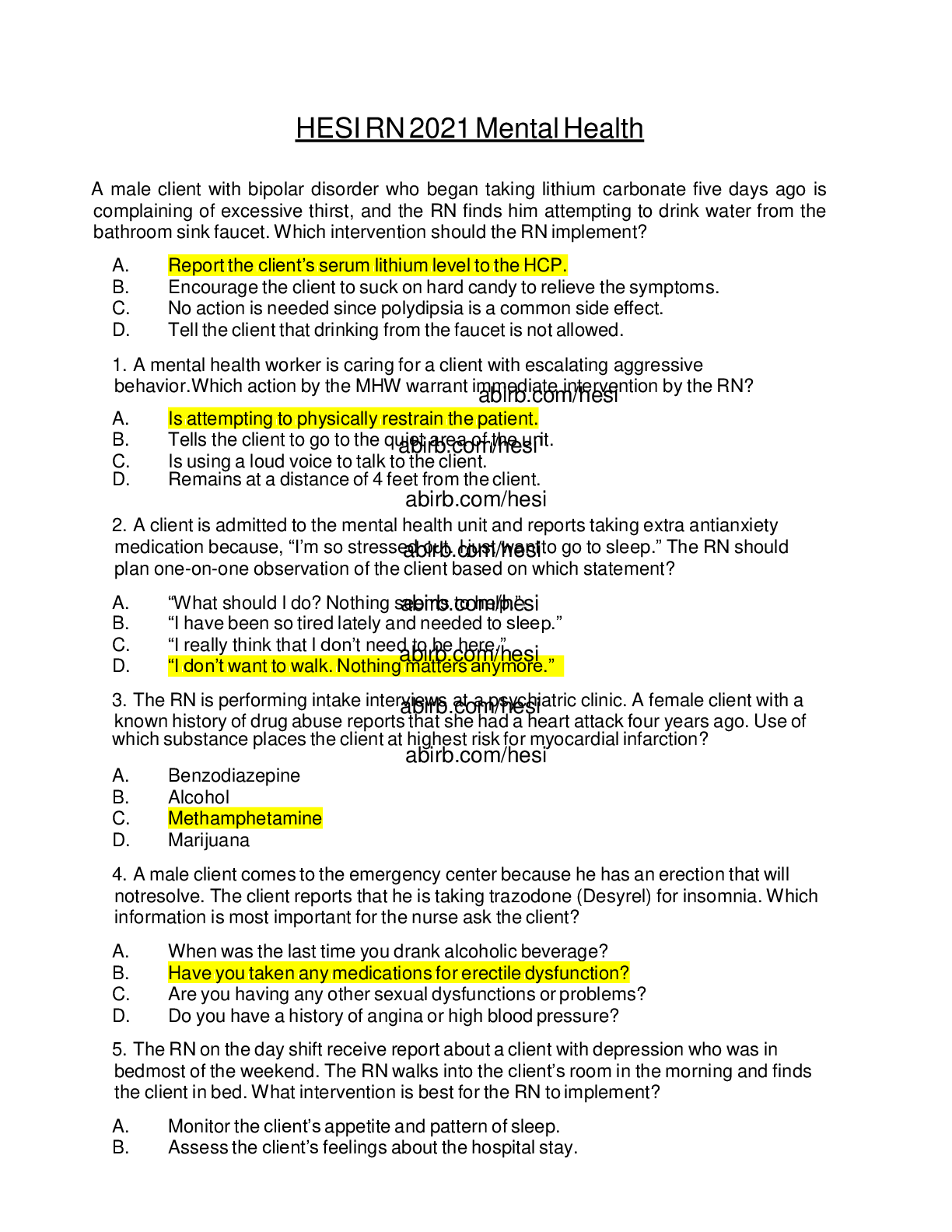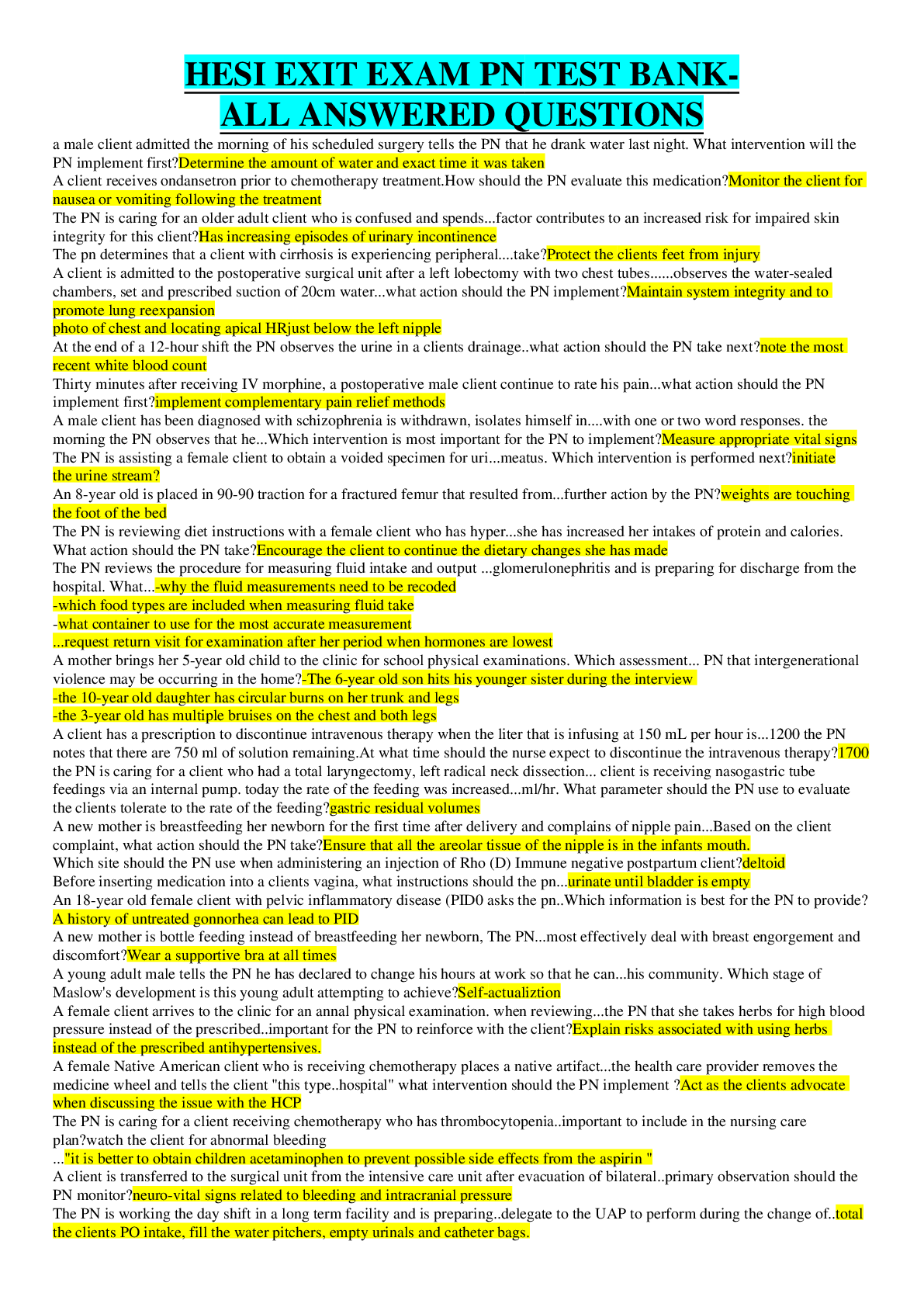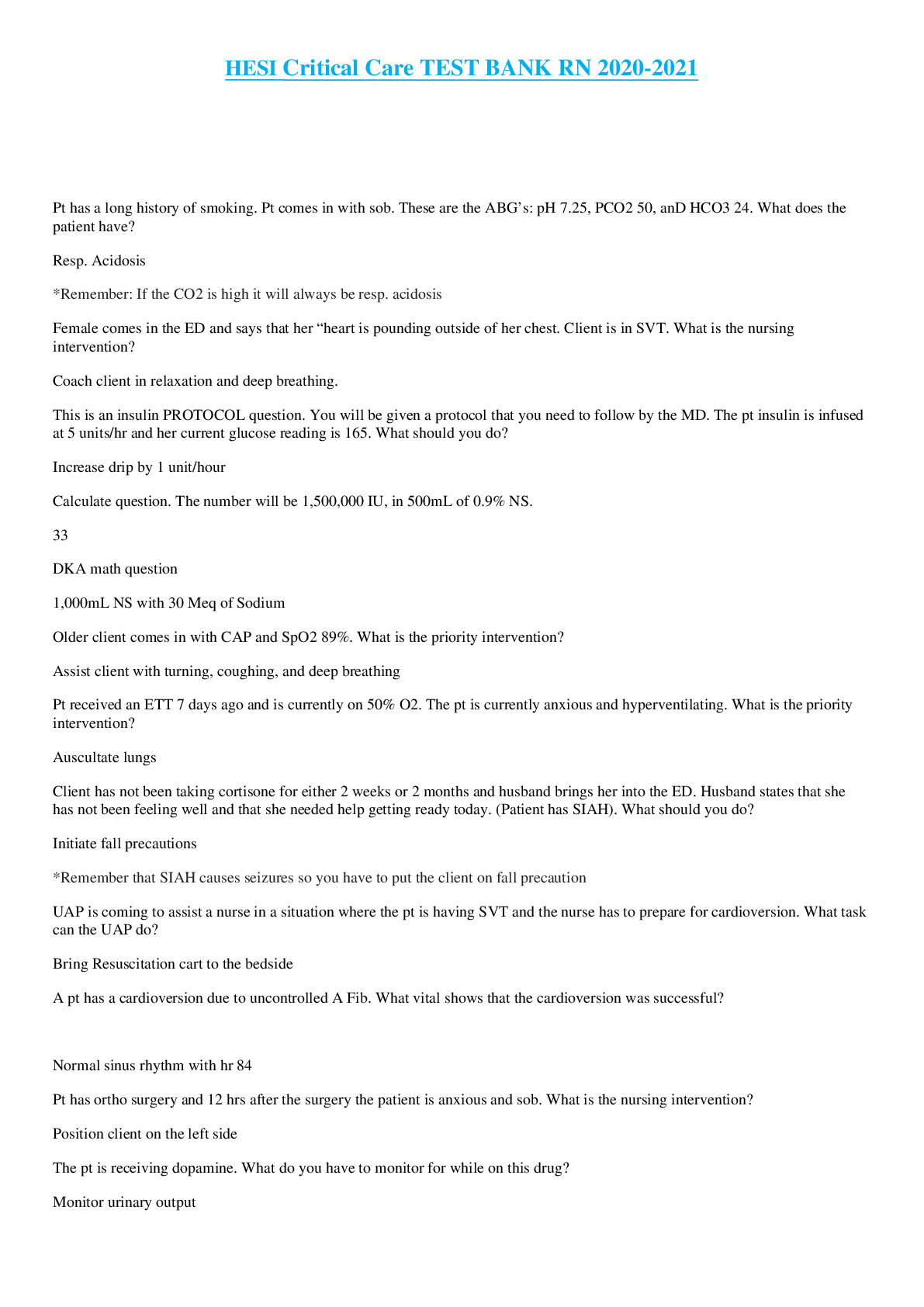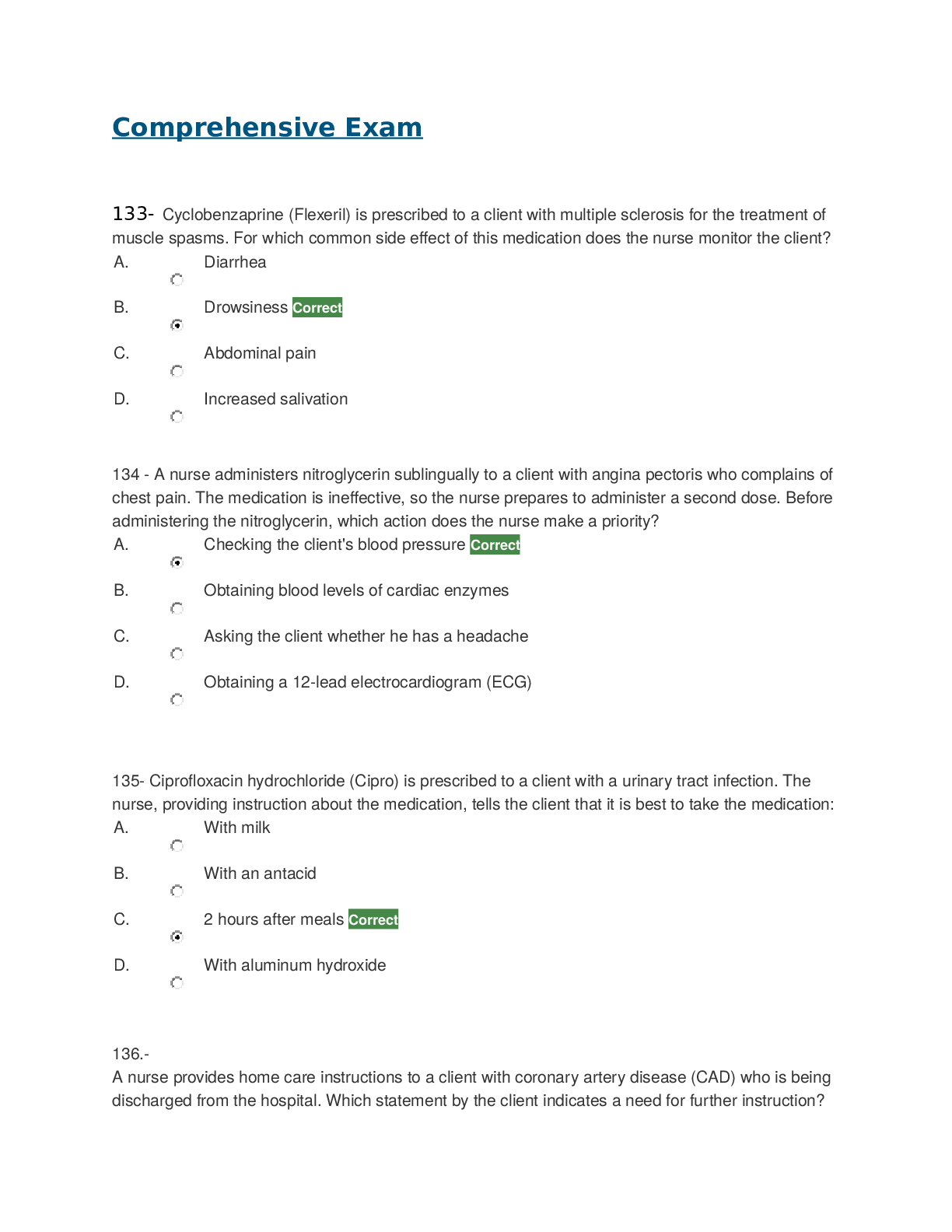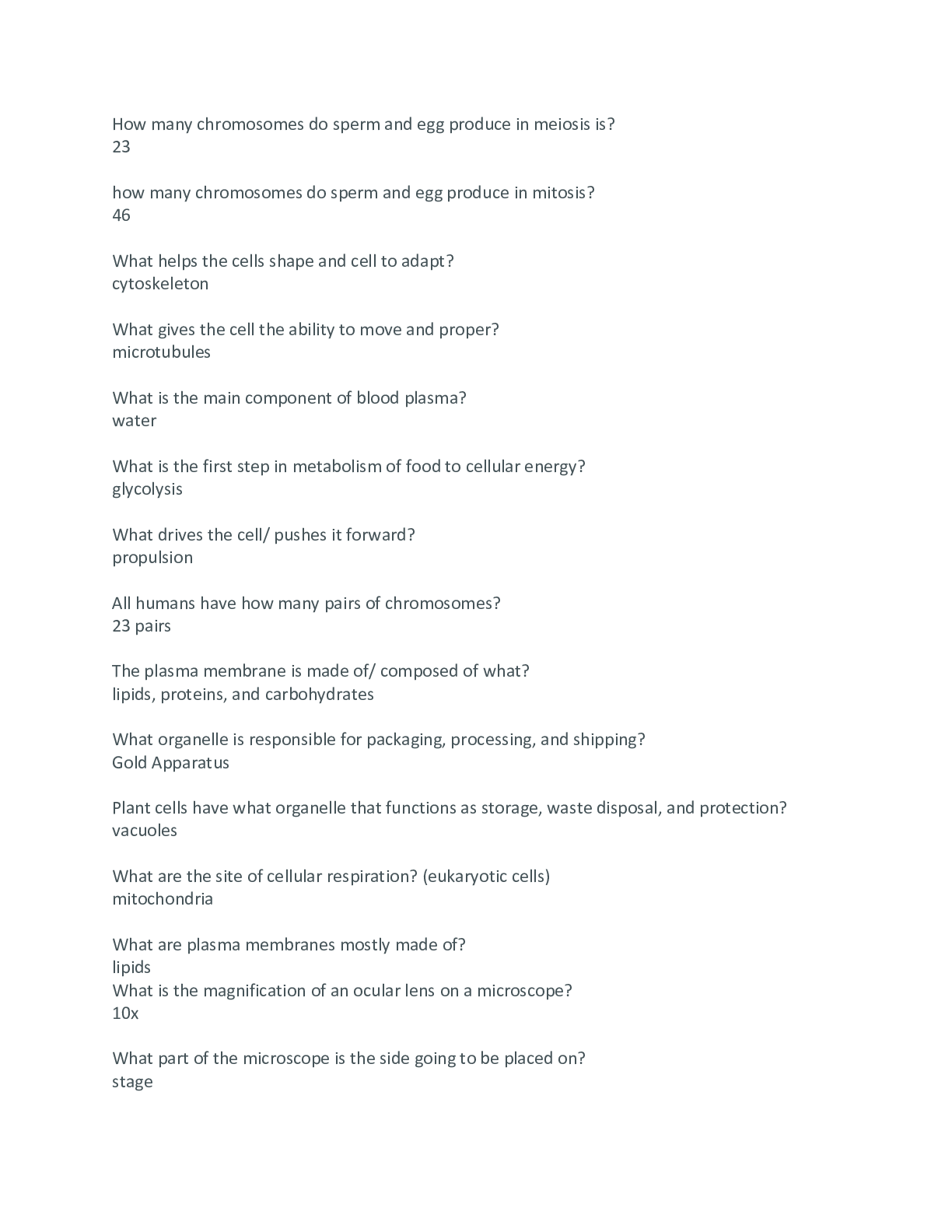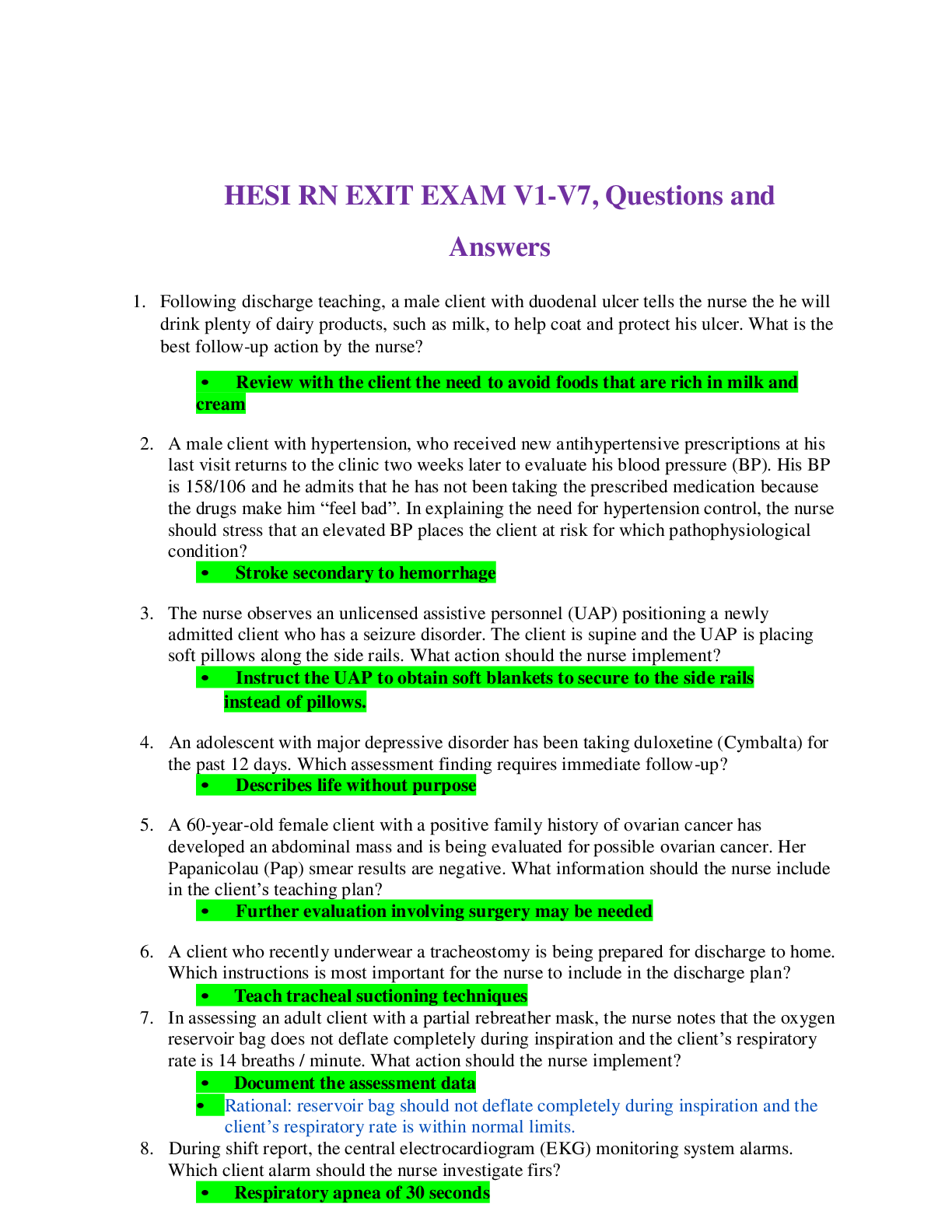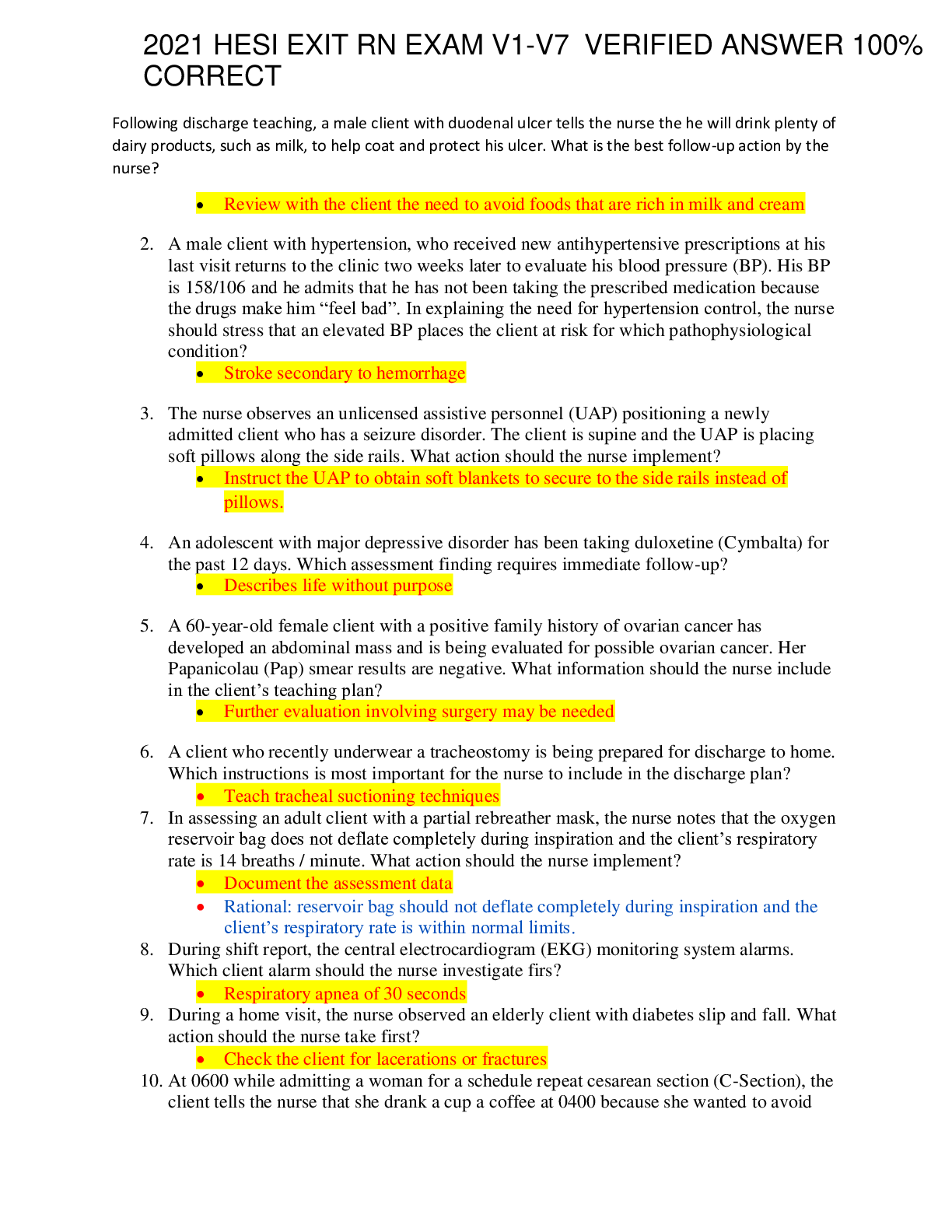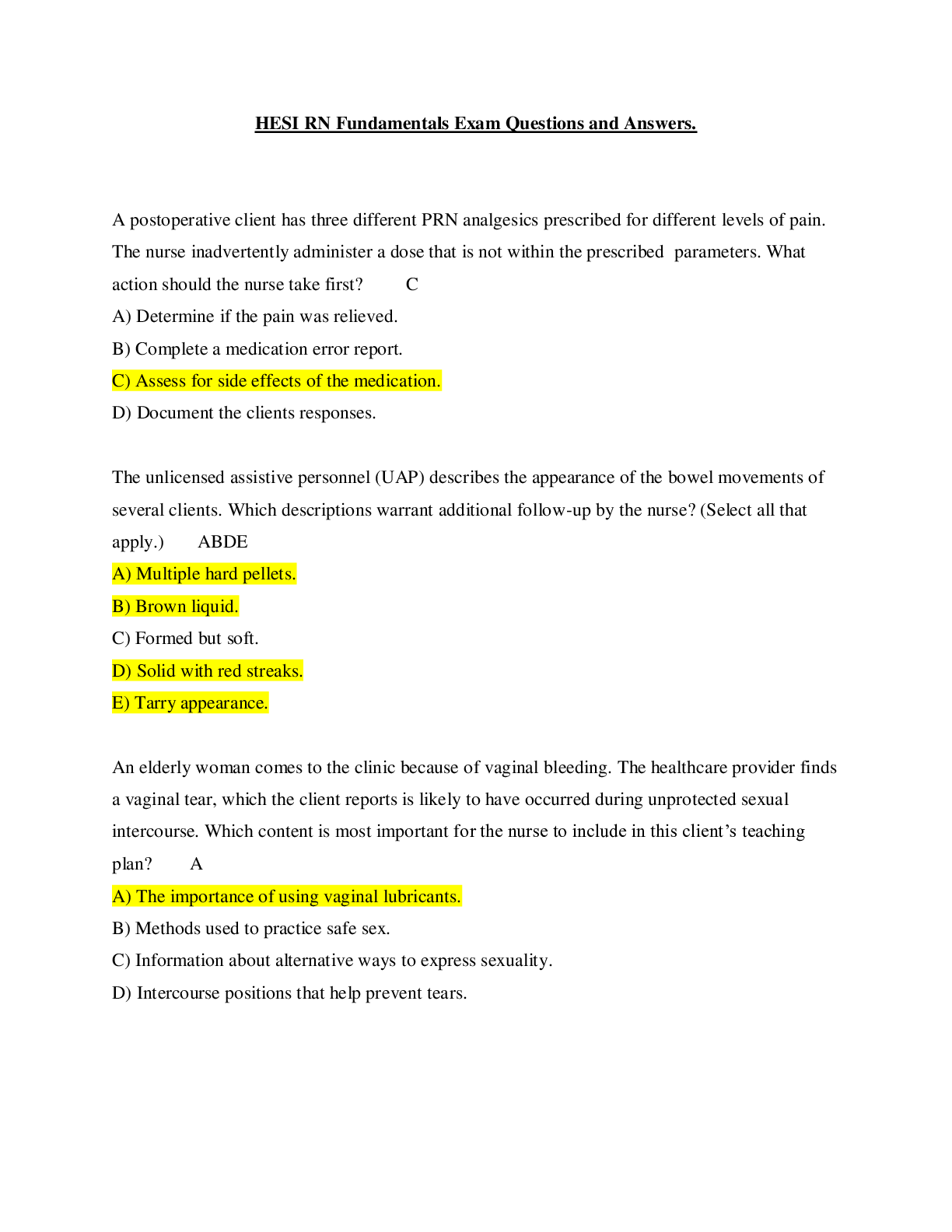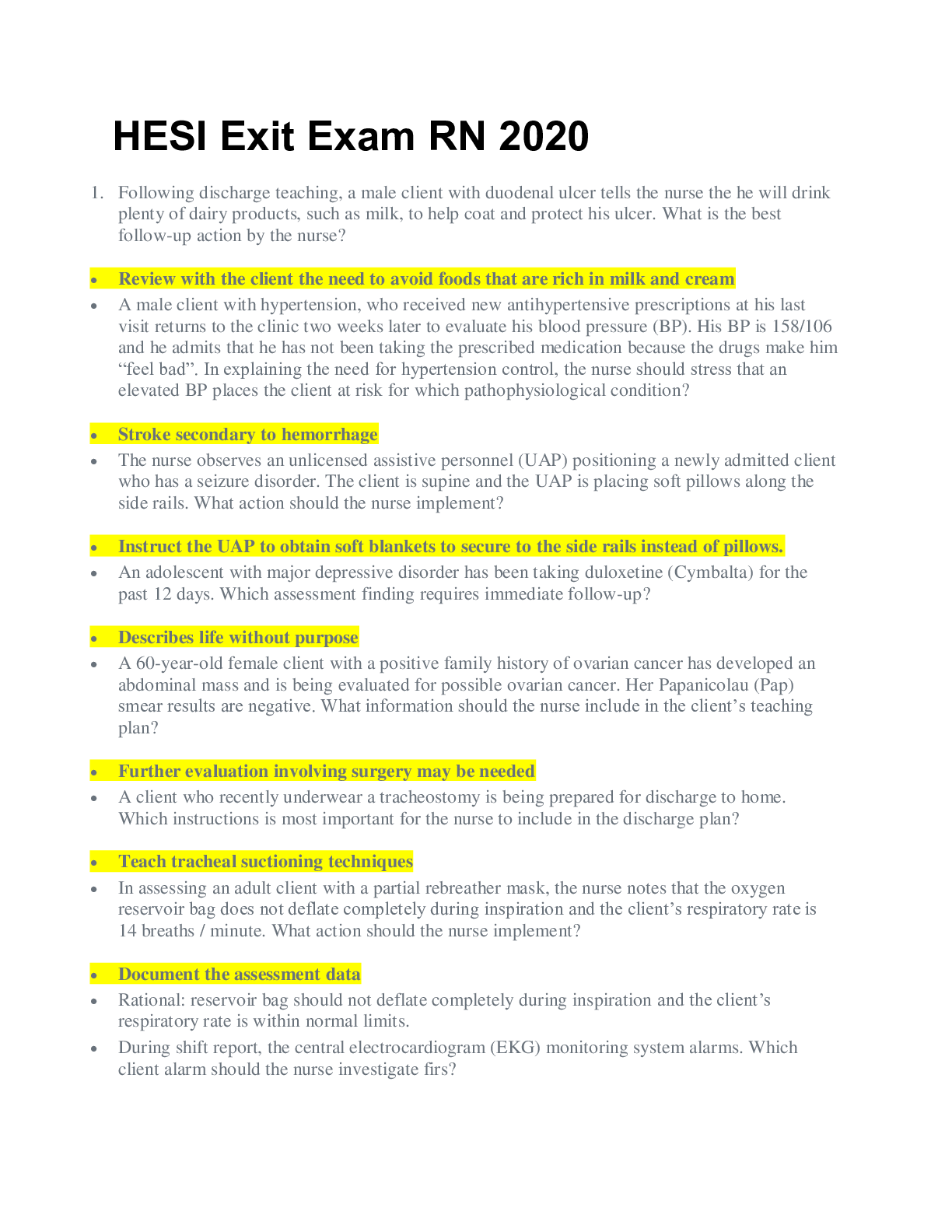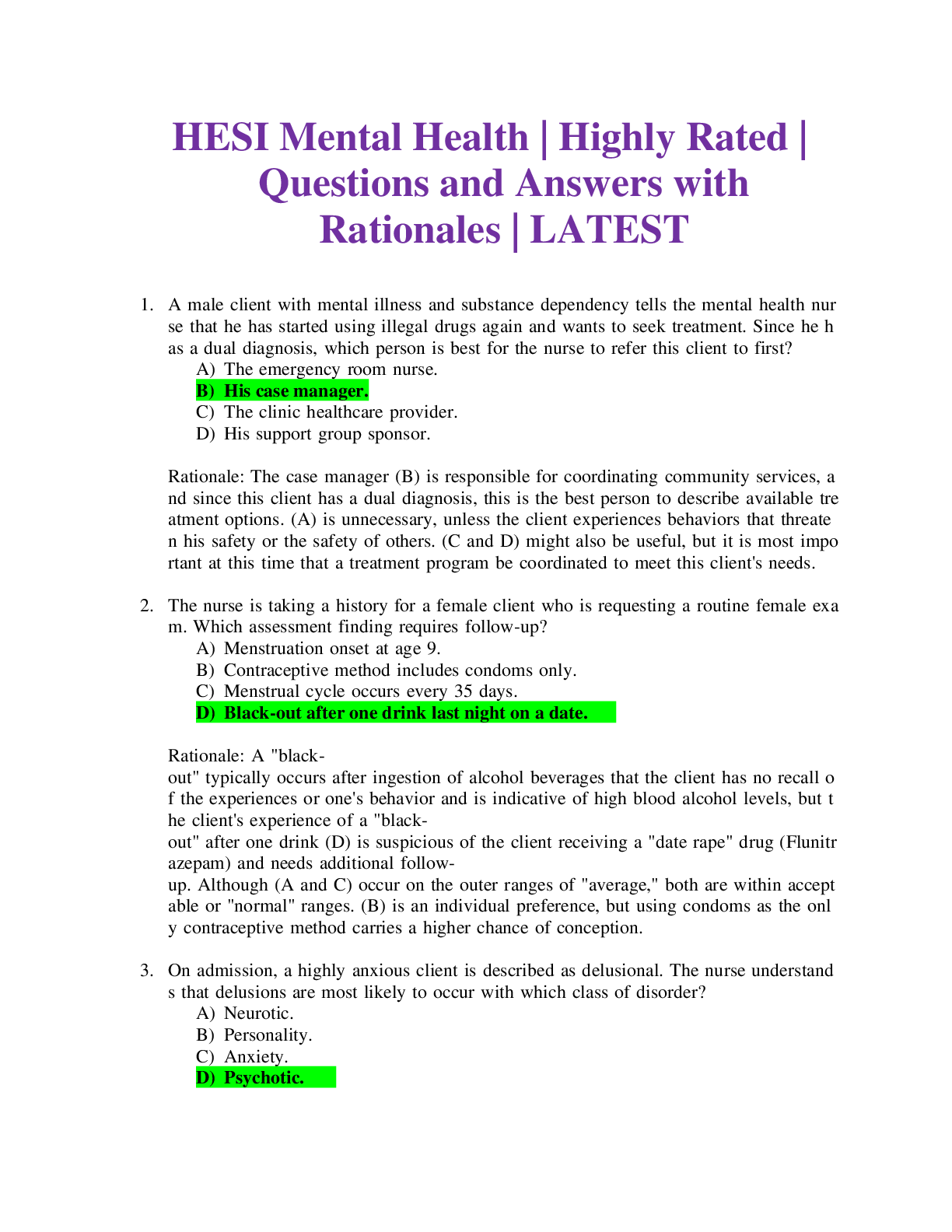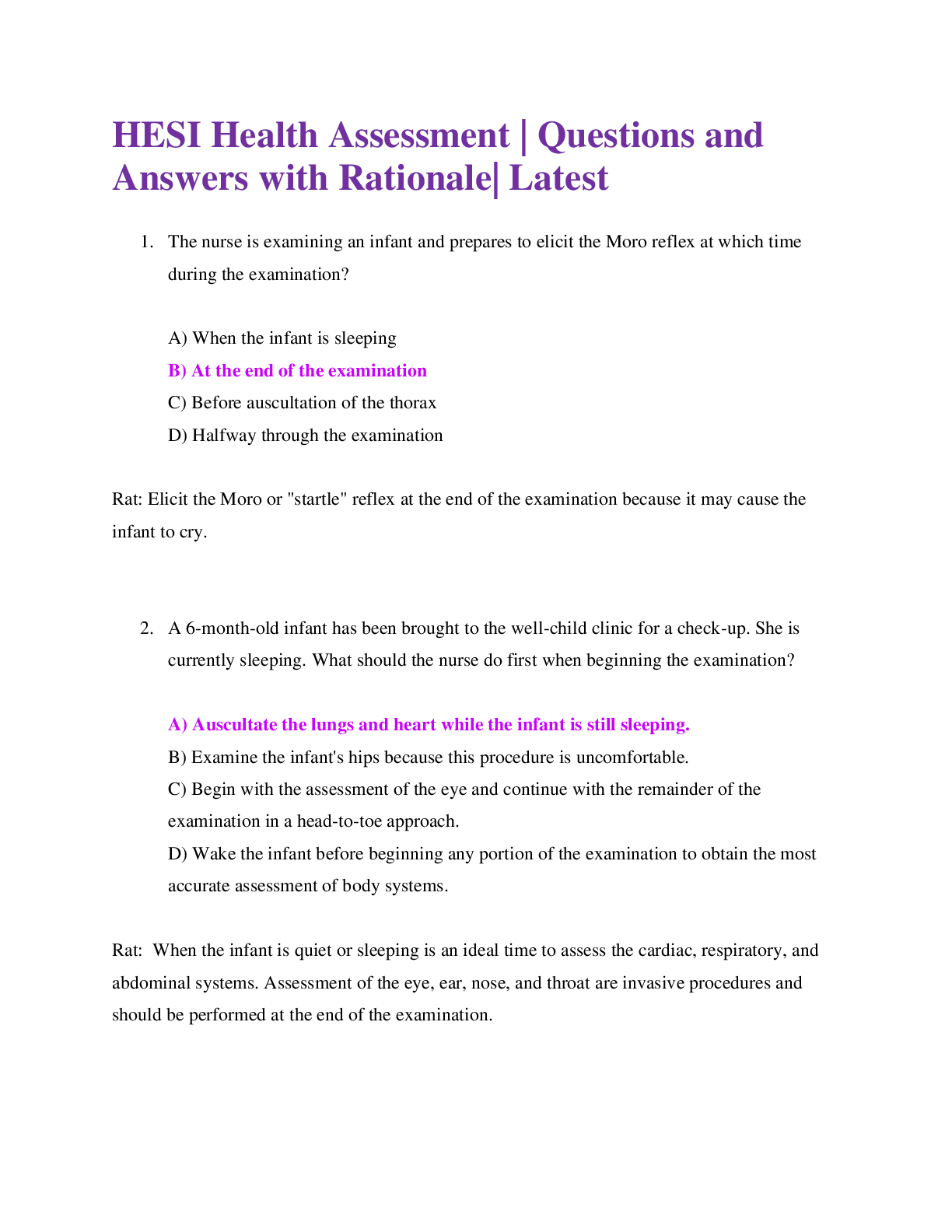*NURSING > HESI > Hesi Study Module 3_Mental Health Concepts. Contains Includes 50 QnA with the Rationale, Test taking (All)
Hesi Study Module 3_Mental Health Concepts. Contains Includes 50 QnA with the Rationale, Test taking strategy, Level of Cognitive Ability, Client Needs, Integrated Process, Content Area, Priority Concepts, Giddens Concepts, HESI Concepts and the References.
Document Content and Description Below
HERE ARE THE QUESTIONS LISTED Hesi Study Module 3: Mental Health Concepts Questions 1. ID: 8482587678The mother of a 3-year-old child tells the nurse that her child hit her doll after the mother sc... olded her for picking the neighbors’ flowers. Which defense mechanism used by the child does the nurse identify in the mother’s report? Projection Sublimation Displacement Identification 1. ID: 8482589936A client says to the nurse, “I’ve been following my diet and taking my medication. What else do you want to talk about today?” Which response would be most helpful during the working phase of the therapeutic alliance? “Sounds fine to me. Let’s meet again in 6 months.” “I don’t believe that you have been following your diet, because you haven’t lost any weight.” “Well, you’ve talked about diet in your terms, but perhaps I should test you on specific things.” “Some people have added exercise to diet and medication therapy and gotten positive results. Do you think that this would work for you?” 2. ID: 8482589970As the nurse prepares to interview a client being admitted to the mental health unit, the client says, “I asked my family to bring me in here to talk to someone, but now I don’t know where to begin.” Which response by the nurse would be most helpful? “Why not just start talking and see where it takes you?” “If I were you, I’d begin with what you were doing this morning.” “Perhaps you can start by sharing some of your most recent concerns.” “Don’t worry. Everyone who comes in here for the first time feels reluctant to talk.” 3. ID: 8482592914During a mental health intake interview, a young adult client who lives with his family rent free says, “I’m tired of not being able to offer my friends a beer just because my folks don’t believe in taking a drink socially.” Which nursing response would be therapeutic? “Well, I guess you could move out and live on your own if you wanted to.” “It seems that your parents expect you to follow their rules when you live under their roof.” “You tell me you live rent free, yet you expect the same privileges as an adult who supports the household?” “Well, if you directly discussed your concerns with them, I guess it’s a case of ‘When in Rome, do as the Romans do.’” 4. ID: 8482591943The nurse developing a plan of care for a client whose spouse recently died determines the client has a problem with dysfunctional grieving. Which priority intervention does the nurse incorporate into the plan? Monitoring the client’s sleep pattern Assessing the client’s risk for violence toward self and others health care provider Obtaining a health care provider’s prescription for an antidepressant Assisting the client in resolving the grief through emotional, cognitive, and behavioral means In 5. ID: 8482589982A client in the mental health unit tells the nurse, “My husband makes all the decisions about money, but I’m the one who’s making the money now, not him. He needs to back off, but he’s always directing every decision we make.” Which nursing response would be the most therapeutic? “Have you told your husband to back off”? “You’re making the most money, so the decisions should be left to you.” “How do you feel the money decisions could best be handled in your household?” “You seem frustrated with your husband’s habit of controlling financial decisions.” In 6. ID: 8482589950The nurse is developing a plan of care for a client who recently received a diagnosis of acquired immunodeficiency syndrome and is experiencing difficulty adjusting to the illness. Which action is an inappropriate intervention for this client? Monitoring the client for signs of self-harm Helping the client verbalize concerns related to fear Assisting the client with problem-solving and decision-making Discouraging social networking to prevent the spread of infection 7. ID: 8482589990How does a client who has lost a spouse show that she is successfully completing the tasks of mourning? Select all that apply. Relating that its better “he went first” Reporting that sleeping alone is so hard now Purchasing a smaller car she is comfortable driving Placing a picture of her husband on the bedside stand Heard explaining to family that illness “took” her husband 8. ID: 8482591989The psychiatric nurse is caring for a 15-year-old girl who has been hospitalized for bipolar disorder. The client tells the nurse that she had her hair styled just like her young math teacher, whom she admires. Which defense mechanism should the nurse recognize that the client is using? Projection Regression Identification Intellectualization 9. ID: 8482592903The mental health home care nurse says to the client, “Do you feel ready to try attending a group session at the clinic?” The client shakes his head. Which nursing statement would be therapeutic? “No? Why not?” “You seem to be saying no. Would you tell me more about your reluctance?” “OK, but I hope you will let me know when you feel ready to attend a group session at the clinic.” “Perhaps a group session would be too overwhelming for you right now. How about just seeing me?” 10. ID: 8482589996A single parent whose son was suspended from school for carrying a gun into the school says to the nurse, “I know he has no dad, but I’ve brought him up to know better, and anyway, where did he get the stupid gun? What should I do? He just won’t listen to me.” Which nursing response would be helpful at this time? “Boys who are cared for only by their moms are at highest risk for violent behavior.” “There is quite a bit that you can do. Let’s talk about what you’re already doing first.” “Do you know all of your son’s friends, or is he left alone after school because you work?” “Many young people die of gunshots every day in this country, so your son’s behavior is unacceptable.” 11. ID: 8482589952A client says to the nurse, “My doctor says he thinks I’m ready to taper off my pain medication, but the new painkiller he prescribed doesn’t relieve my pain the way the other pill did. I get pain when I try to do things.” Which nursing response would be most supportive to the client? “Your health care providerhealth care provider feels that your body is physically ready to make the change in medication.” “I think you need to listen to your health care provider health care providerwhen it comes to taking such strong medication.” “Well, your health care provider is concerned that you will become physically dependent on the first painkiller.” “Perhaps if I medicate you about a half-hour before you plan to start your daily activities, the medicine will be more effective.” 12. ID: 8482587688A client who was employed as a corporate manager before being laid off says to the nurse, “My wife thinks that I should work in a menial job to maintain our lifestyles until I find another job as a corporate manager, but I don’t feel I should have to humiliate myself like that.” Which nursing response would be therapeutic? “Have you shared your feelings with your wife?” “You seem to feel that a less prestigious job would be humiliating for you.” “Oh, I agree with you. Let her get another job if she needs that much money.” “How soon will you be able to find work? If this is permanent, you may need to swallow your pride.” 13. ID: 8482587686A young woman who has been divorced twice says to the nurse, “I’ve decided not to date men ever again! It never works out for me. Now I’m left with two children to bring up.” Which nursing response would be therapeutic? “Oh, me too. I always pick the worst kind of men, so I know just how you feel.” “Divorce is more difficult for children. Maybe you should focus on them for now.” “You’ve been unfortunate, but you seem to be focusing on yourself and what you have to do.” “You talk about how the divorces affected you. Tell me how your children are dealing with the loss.” 14. ID: 8482589964A client says to the nurse, “What does my psychiatrist mean when she says that my illness is biologically based?” Which nursing statement would be the most informative? “Mental illness always has its roots in the family.” “Mental illness is a result of environmental factors.” “Today we know that all mental illness is genetically inherited.” “There are many possible physical causes of mental illness, and they include problems in the brain.” 15. ID: 8482591902The nurse is caring for a 39-year-old client who has experienced a mild brain attack (stroke). The client is recently widowed, is very active physically, and has two young sons. The client says to the nurse, “I don’t know what my sons will do if anything permanent happens to me. We have no other relatives, even on my late wife’s side.” Which of the following nursing responses would be therapeutic? “You seem to be feeling very troubled.” “You are working to get better, but you’re worrying about things that aren’t going to happen.” “You seem to be feeling very powerless right now, yet you’re getting better, so why worry about what won’t happen?” “I am troubled that you are worried over the worst possible things that could happen rather than worrying about the efforts needed to strengthen your family situation.” 16. ID: 8482592901A client who has been admitted to a surgical unit with a diagnosis of cancer is scheduled for surgery in the morning. When the nurse enters the room and begins the surgical preparation, the client states, “I’m not having surgery — you must have the wrong person! My test results were negative. I’ll be going home tomorrow.” Which defense mechanism should the nurse recognize that the client is using? Denial Psychosis Delusions Displacement 17. ID: 8482587684A young adult client who is dying says to the nurse, “I keep asking my wife what I can do for her and our daughter before I die, but she refuses to tell me.” Based on the client’s statement, what is the appropriate nursing intervention? Teaching the client’s wife to write down her thoughts and feelings and to read them to her husband Saying to the client, “It sounds to me like your wife is truly comfortable and doesn’t want you to worry needlessly” Talking with both the client and his wife about the importance of expressing their feelings and how to do it in healthy ways Talking with all family members, including the daughter, about the importance of expressing their concerns and feelings to the dying client Awarded 1.0 points out of 1.0 possible points. 18. ID: 8482592934A 45-year-old client says to the nurse, “Since I left my wife and children, I can hardly make ends meet between child support and trying to support myself. I don’t know why I bother going to work when my wife and kids take just about everything I make.” Which nursing statement would be therapeutic? “I wonder why you left your wife and children.” “What would you expect your wife and children to do? They didn’t leave you.” “You seem to be very angry about carrying out your responsibility to your children.” “Do you feel that child support is designed to help children, not punish spouses who leave?” 19. ID: 8482592920A survivor of a nightclub fire that killed more than 100 people says to the nurse, “It should have been me. How come I got out and they didn’t?” Which response by the nurse is appropriate? “I don’t know what to say. It was a terrible fire. I’m so sorry this happened.” “It seems that you’re blaming yourself for something that was beyond your control.” “It seems to me that you’re making this all about you when many people died in that fire.” “You should be thankful that you’re a survivor. The victims and their families lost, not you.” 20. ID: 8482587676In planning the care of a client dying of cancer, the nurse seeks to have the client verbalize acceptance of his impending death. Which statement indicates to the nurse that this goal has been met? “I’d like to have my family here when I die.” “I’ll be ready to die once my daughter gets married.” “I want to go to my family reunion; then I’ll be ready to die.” “I just want to live to see my grandchildren graduate from college.” 21. ID: 8482589918A client says to the nurse at the mental health clinic, “My husband and sister-in-law both have terminal illnesses, and my family thinks that because I’m a nurse I should be able to handle everything.” Which nursing response would be therapeutic? “Are you saying you are overly involved and will need to emotionally distance yourself to be therapeutic for your family?” “Shame on them for expecting so much from you. Perhaps we need to schedule a family meeting so I can help you set them straight.” “I’m sorry to hear that your loved ones are so ill. As a nurse, you should be able to assist them by using your professional expertise. Perhaps that’s what your family expects from you.” “You’ve seen your loved ones dealing with some troubling events recently. Sounds as if you feel that your family expects more from you than from others in the family because you’re a nurse.” 22. ID: 8482591987A 79-year-old client, recently widowed, says to the nurse, “My wife kept up our condominium single-handedly, and now my kids expect me to cook and clean for myself. I’m not lazy, but I don’t know how to cook and I’ve burnt myself twice just frying up what was supposed to be bacon and eggs. I’m so frustrated and I’ve already lost 10 lb this month.” Which initial nursing statement should the nurse make to the client? “I’m calling the doctor immediately to obtain a homemaker for you!” “Seems as if you feel lost without your wife and maybe a bit ignored by your children.” “First things first. What are you doing eating bacon and eggs? That’s not a good meal for you.” “Meals-on-Wheels can help you minimize the frustration you are having cooking. Are you a member of the local senior center?” 23. ID: 8482592918A health care provider (HCP) tells a client that she has cancer, that her illness is terminal, and that she has a 6-month prognosis. After the health care providerHCP leaves the client’s room, which therapeutic statement should the nurse make to the client? “I am so sorry about this. You are my favorite client, and I will take good care of you.” “What did your HCP tell you about your condition? Can you tell me what you’re thinking about?” “Do you have any questions about what is happening with you? I can assure you that I will do everything I can to help minimize your pain.” “Do you want me to get the phone so you can talk to your loved ones, or do you have questions for me about what’s happening with you?” 24. ID: 8482589972The wife of a client who is dying says to the nurse, “I am able to take off the 6 months from work our doctor feels that my husband will live, but what if he lives beyond that time?” Which therapeutic response should the nurse make? “Only you and your husband can determine how you should best allocate your work leave.” “Your husband has managed to be active up to now, so he could live longer than predicted, but his actual lifespan remains unclear.” “Are there other options for you in taking work leave? Perhaps you could simply reduce your work hours at first so that you can extend your compassionate leave.” “Why not write down the pros and cons of taking work leave all at once and any other options and then decide with your husband and family which would be most helpful?” 25. ID: 8482592928The wife of a dying man is ignoring his rapid physiological decline and imminent death. She continues with her usual activities, exhibits inability to remember what others have just told her, and misses important appointments. Which therapeutic statement should the nurse make to the wife? “It isn’t unusual for family to suffer from anticipatory grief when a loved one is dying.” “I cannot emphasize how much your husband needs you to be there for him right now. He is in the stage of denial.” “You will need to concentrate on getting to these appointments on time and write down what everyone says so you will remember.” “Can you talk about what’s happening to you right now? Your behavior is not appropriate at this stage of your husband’s illness. You seem to be having sympathy pains for him, like men during their wives’ pregnancies.” 26. ID: 8482589926An older adult client who is dying says to the nurse, “My son is 40 years old, but he works in a very poorly paying job and is always borrowing money from me. I don’t know how he’s going to manage without me.” Which response by the nurse would be therapeutic? “Could you share your feelings with your son just as you have with me?” “Sounds as if your son will never grow up and learn to take care of himself.” “Goodness. At 22, I supported myself and never asked my mother for anything.” “I wonder why you’re so worried about your adult son when you need to concentrate on you?” 27. ID: 8482587698The widow of a man who was killed a week ago in a hit-and- run accident while walking the family dog says, “I should have just let the dog run in the backyard or gone with my husband. Our own parish priest hit my husband and finally surrendered to the police. He brought a lawyer with him because he’s worried about himself, not my husband. I hate him so much, my stomach hurts.” Which nursing statement would be therapeutic? “Of course you’re angry. Who wouldn’t be? Yet nothing is ever clear cut, is it?” “You not only lost your husband but also learned it was at the hands of someone you looked up to.” “You’re having stomach pain? You should get checked for an ulcer or other gastric problem.” “I wouldn’t blame you if you never entered a church again. This is a terrible thing for the head of a church to do.” 28. ID: 8482592907A single mother whose only son died 2 months ago says to the nurse, “I’ve been bothered at work with thoughts of my son. Suddenly I’ll think of something awful I said to him years ago or some punishment I gave him because he’d been bad.” Which plan should the nurse include in caregiving? Scheduling the client for an appointment with the psychiatrist, because this is a pathological manifestation. Calling the health care provider to report that the client is a high risk for suicide and increasing the frequency of visits with the client. Seeking emergency certification for the psychiatric inpatient unit at the community hospital because of high lethality concerns and visiting the client daily. Explaining that bereaved persons often describe intrusive thoughts of negative experiences with the deceased and then increasing the frequency of nurse-client visits. 29. ID: 8482591985A client who is a health care provider says to the nurse, after receiving a diagnosis of terminal lung cancer, “All my life I took care of my clients, and now my family is taking care of me.” Which statement is a therapeutic nursing response? “Your family is caring for you now.” “Well, you’d expect them to care for you, wouldn’t you?” “It is an honor for all of us to care for you. We want to help you.” “You can look back on so many wonderful people you saved and cared for.” 30. ID: 8482591993The parents of a 20-year-old who was killed while driving drunk say to the nurse, “We’re so devastated, but we are also angry that she would drink and drive when we told her over and over not to.” Which statement by the nurse would be therapeutic? “Young people don’t always obey their parents.” “Everyone feels guilt or anger when they lose a loved one.” “Does anyone in the family have a drinking or drug problem?” “Your sadness over losing your daughter is mixed with anger at her driving while intoxicated.” 31. ID: 8482587696A nursing student is assigned to work in the emergency department to assist victims after a tornado. The student says to the nurse in charge, “I don’t know how to help these parents. Their son was just decapitated by a flying piece of glass, and they won’t leave him. They did mention that they are Catholic.” Which intervention does the nurse suggest for inclusion in a plan of immediate care for the family? Telling the student not to disturb the family until the end of shift Calling their family priest immediately to come help them to let their son go Asking the emergency department health care provider to join the student in requesting that the family let the nursing staff care for their son Joining the family and, after they have been able to be with their son for some time, helping them relinquish their son’s body to the nurses 32. ID: 8482589978The nurse is caring for a bereaved man with acquired immunodeficiency syndrome who lost his twin brother in a rock-climbing accident a month ago. Which statement by the client should cause the nurse to be concerned? “Lately I’ve been feeling that life isn’t that great.” “You’d have thought that I would be the one to die first.” “I should have made him stay home. He was always clumsy.” “I miss him so much. We were close and talked almost daily.” 33. ID: 8482589968A client whose husband died 2 months ago says to the nurse, “After church, I visit my husband’s grave and talk to him. It comforts me, but my daughter thinks I’m morbid and crazy and is upset with me because I don’t want to meet her for coffee after church like I used to.” Which statement by the nurse would be therapeutic? “You need to stop your visits immediately, or your daughter will have you examined for a mental disorder.” “Perhaps you could reduce your visits to his grave to once a month and meet your daughter for coffee like you used to.” “I think your visits are perfectly normal. After all, you were married for a long time. You’ll stop when the winter weather comes.” “Sounds as if you have had difficulty letting your husband go from your life. What would happen if you visited his grave less frequently?” 34. ID: 8482589922The nurse is talking to a client whose spouse died 10 months ago. Which statement by the client indicates successful mourning? “I’m planning a trip to England next fall to tour the mansions and their gardens.” “I must confess that I have taken to drinking more than I should at night, but a drink or two helps me to sleep alone in that big house.” “My son has taken over managing my money because I got into a little mischief with my charge cards. I’m restricted to one debit card now.” “Last night they had to treat me in the emergency department because I swallowed a few too many pills. Lately I’ve felt as if I can’t go on alone.” 35. ID: 8482589906A 74-year-old widower of 3 months says to the nurse, “When my wife died, I lost my love and my best friend. Everyone I cared about is dead. We both were only children, and we had no kids. I’m more than ready to go when the time comes.” Which nursing response should the nurse make? “Are you thinking of ending your life because your time has come?” “Did you know that many people live happier lives without children?” “It must seem very lonely to you. I can’t believe that you never had any children.” “When my dad died, my mother said some of the things you’re saying now, and she had three kids.” 36. ID: 8482591995The nurse coordinates the use of hospice care to visit a dying client who will be going home with his family. Which is a function of hospice services that the nurse should tell the family? Helping the client focus completely on his physical health Providing bereavement support to the family after the client’s death Helping the family stop the client’s efforts to go out at night with his friends Working with the client to sustain hope by talking of recent research breakthroughs regarding his illness 37. ID: 8482592912A dying client with agoraphobia says to the nurse, “I’ve been unable to leave this house without tremendous effort for so long, and now it doesn’t matter.” Which statement by the nurse would be therapeutic? “It doesn’t matter? Can you share your feelings with me?” “Your gardens are beautiful now. Would you like to stroll in them after our work?” “Did you go through systematic desensitization with your doctor? I understand that it works well.” “I know what you mean. I spent more than $2,000 on a dental implant and still wound up with false teeth.” 38. ID: 8482587672A dying client says to the nurse, “How do I tell my parents that I am dying of AIDS ?” Which statement by the nurse would be therapeutic? “Well, isn’t it better that they learn from you than for them to learn on their own?” “Sounds as if you’re thinking that it’s time for you to tell your parents about your disease.” “I’ve worked with this illness for many years now, and there just doesn’t seem to be an easy way to do this.” “Are you saying that your parents don’t know about your illness?” 39. ID: 8482591977The wife of a victim of a gas explosion says, “It’s not bad enough that I’ve been left alone to care for two children — now the company is denying our claim for compensation and we have to join a class action suit to get my husband’s pension.” Which statement by the nurse would be therapeutic? “Get a lawyer! That’s what you all need to do.” “Do you believe that a class action suit is the thing and that you are in the right?” “You’re saying that being left a widow with children is difficult enough, but now you’ve got to fight for your benefits.” “Walk away. It’s too much to even think about at your age, and how can you get caught up in all this with children and work, too?” 40. ID: 8482591949A young widow of 18 months says to the nurse, “I’m going to need a babysitter, because I’m going on a blind date at my brother and sister-in-law’s house. They fixed me up, but I think it may be too soon.” Which statement by the nurse would be therapeutic? “Hello? You go girl! You can see it’s only natural, can’t you?” “By the end of a year, most people are able to renew their interest in other people and activities.” “Nonsense. Your children need a new father, as your family knows. Your husband would want you to go on with life.” “If it were me, I would be dating other men by now. After 6 months of mourning, most of society feels that it’s okay.” 41. ID: 8482591928A client who is an attorney says to the clinic nurse, “I’m worried about my wife. She’s been so distant and disorganized since our son died of leukemia 4 months ago. She never suggests that we go out or take our other children anywhere. Is this normal, or do I need to get her to a doctor?” Which statement by the nurse would be therapeutic? “Absolutely. It sounds as if she may be experiencing a severe depression.” In “To be safe, it would not hurt to have her see your family doctor, or maybe you have a member of the clergy she can talk to.” “The reluctance to resume activities and overprotect your other children is a normal part of bereavement and will subside in 2 months.” “It’s normal, but by the end of a year you can expect that your wife is improving and able to redirect her energy. Have you expressed your concerns to her?” 42. ID: 8482589932The young nurse has just completed postmortem care of a 16- year-old client who died of cancer. The nurse says to the nurse manager, “I never get sick, and this client kept telling me that he couldn’t remember not being ill. I feel terrible and so bad for him and about what he went through.” Which statement by the nurse manager would be therapeutic? “Next time, take someone else in with you for postmortem care, OK?” “Your feelings are normal and will go away after a good night’s sleep.” “Let’s go for coffee and talk about this some more, shall we? We’re both due for our coffee breaks.” “I should never have assigned you someone so close to your own age. I’ll be more careful in the future.” 43. ID: 8482592936The 45-year-old husband of a client with breast cancer who just died says to the nurse, “If our doctor had operated sooner, my wife would be alive now.” Which statement by the nurse would be therapeutic? Say nothing. Simply nod and say “Mm-hmm” noncommittally. “Sounds as if you’re feeling angry and pretty helpless right now.” “Let’s focus not on what was not done but instead on what was done for your wife.” “Your doctor did all he could for your wife. You know, health care providers can only apply their best clinical judgment.” 44. ID: 8482589900During a one-to-one nurse-client session, the client plays with her pack of cigarettes and says, “I just get a couple of DVDs and watch movies so I won’t have to look at my husband or talk to him.” Which coping mechanism does the nurse recognize in the client’s behaviors? Self-blame Avoidance Reframing Wishful thinking 45. ID: 8482589944A 16-year-old client says, “My dad thinks I’m evil, but we get into fights because I let things build up. He never has any time for me because he’s always glued to the TV. He doesn’t even look at me when he talks.” Which statement by the nurse encourages the client to use assertive behavior with his father? “So you’re saying that you let your feelings build up and then you just explode?” “Have you tried standing in front of the television when your dad is watching it?” “What makes you feel that you have the right to fly off the handle just because you feel ignored?” "Have you tried saying that directly to your dad? For example, you could say, ‘I notice that you watch television when I’m telling you things that are important to me.’" 46. ID: 8482587690A client who was formerly a workaholic has lost his job and is being supported financially by his wife. The client says to the nurse, “I know that my wife is disappointed in me, but I can’t seem to get a job doing what I’ve done for 25 years. Why should I take a low-level job when she’s able to support us financially?” Which response by the nurse would be therapeutic? “Can you tell me a little more about this?” “I would dig ditches if it contributed to my family’s well-being.” “Sounds as if you’re lucky to have your wife’s job to fall back on.” “I’m surprised that such a hardworking man is not able to find a job.” 47. ID: 8482589987The psychiatrist notes that a client being admitted to the inpatient mental health unit uses avoidance and denial to cope with stress. Which positive stress response will the nurse plan to focus on when working with the client? Reframing Locus of control Problem-solving Use of social supports 48. ID: 8482589924The husband of a terminally ill client says to the nurse, “My company went bankrupt, my son is a drug addict, my daughter is an alcoholic, and now this! My doctor wants me to try some stress reduction because my blood pressure is up. Whose wouldn’t be? I’ve tried music and relaxation, but they don’t work.” Which statement by the nurse would be therapeutic? “Let’s talk more about what has been helpful to you in the past.” “Before we talk about stress management, let’s discuss your children.” “You have a lot of problems. How long does your wife have to live, and what is her relationship with your children?” “Can you afford to pay for therapy sessions? I see that your benefits are pretty much maxed out, and I’d hate to ask you to take on any additional burden.” 49. ID: 8482587668A young adult client says to the nurse, “All my friends are married and have children. I can’t seem to meet anyone, and I know I’ll never be happy until I meet someone I can care about enough to marry.” Which statement by the nurse would assist the client in reframing the situation? “Sounds as if you’re exaggerating your situation and looking only at the half-full glass.” “It seems that you measure your life and what you need to do against the behaviors of others.” “Aren’t you a little young to be thinking in such negative terms? You do still have plenty of time before your biological clock winds down.” “You can’t seem to meet someone that you care about? You can still find enjoyment in friendships, work, books, and other things as well.” 50. ID: 8482592916The client says to a nurse, “Do you know that after 24 years of marriage I still serve my husband breakfast in bed? After all I do for him, he still doesn’t treat me well. He should treat me better.” Which nursing response is appropriate? “You know, you could work and make money serving food to people.” “I agree. If you can do all that for your husband, he should treat you better.” “It seems that you feel that your husband could treat you well just as you treat him.” “Ask your husband to do the things you’d like. If he doesn’t, tell him you’re leaving him.” [Show More]
Last updated: 1 year ago
Preview 1 out of 71 pages
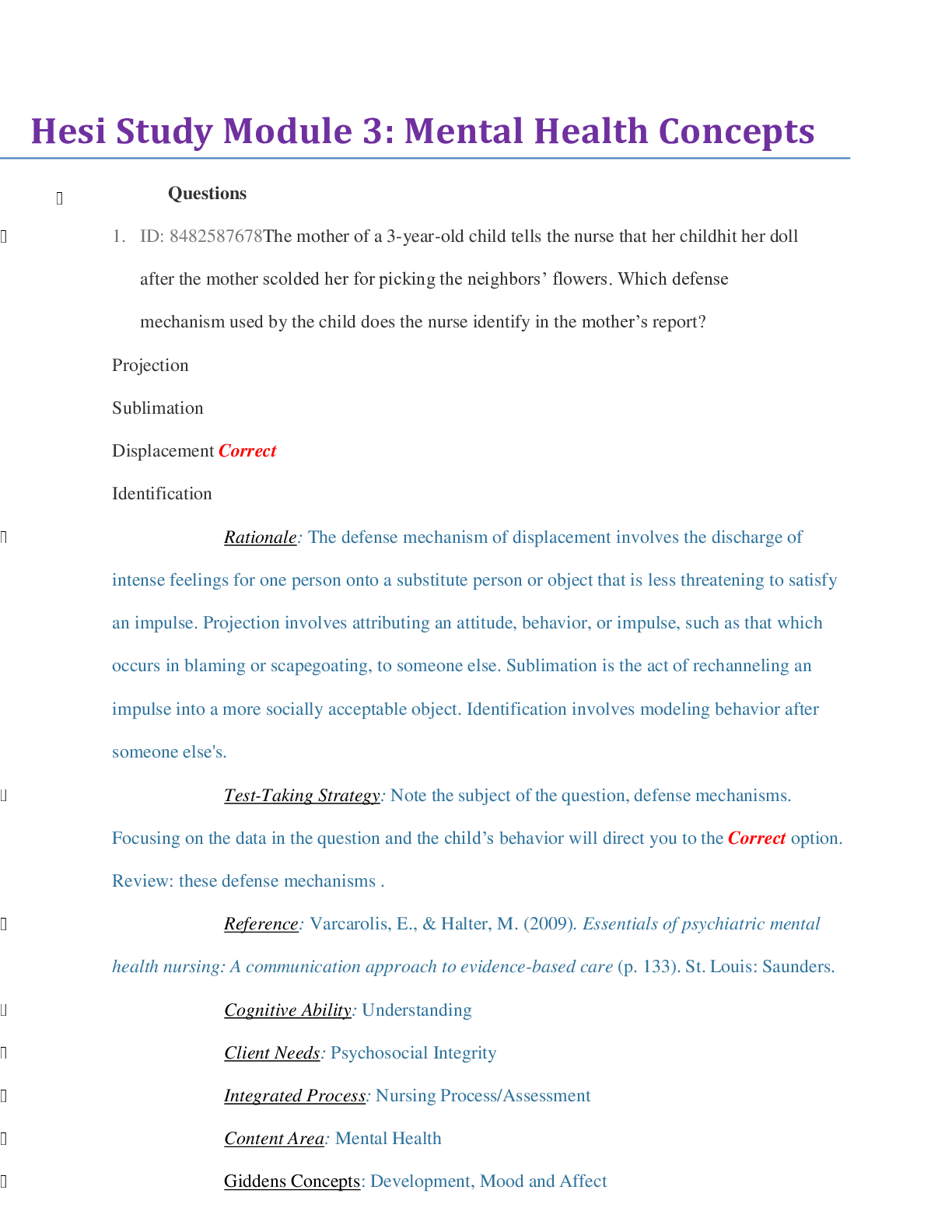
Reviews( 0 )
Document information
Connected school, study & course
About the document
Uploaded On
Apr 17, 2021
Number of pages
71
Written in
Additional information
This document has been written for:
Uploaded
Apr 17, 2021
Downloads
0
Views
140

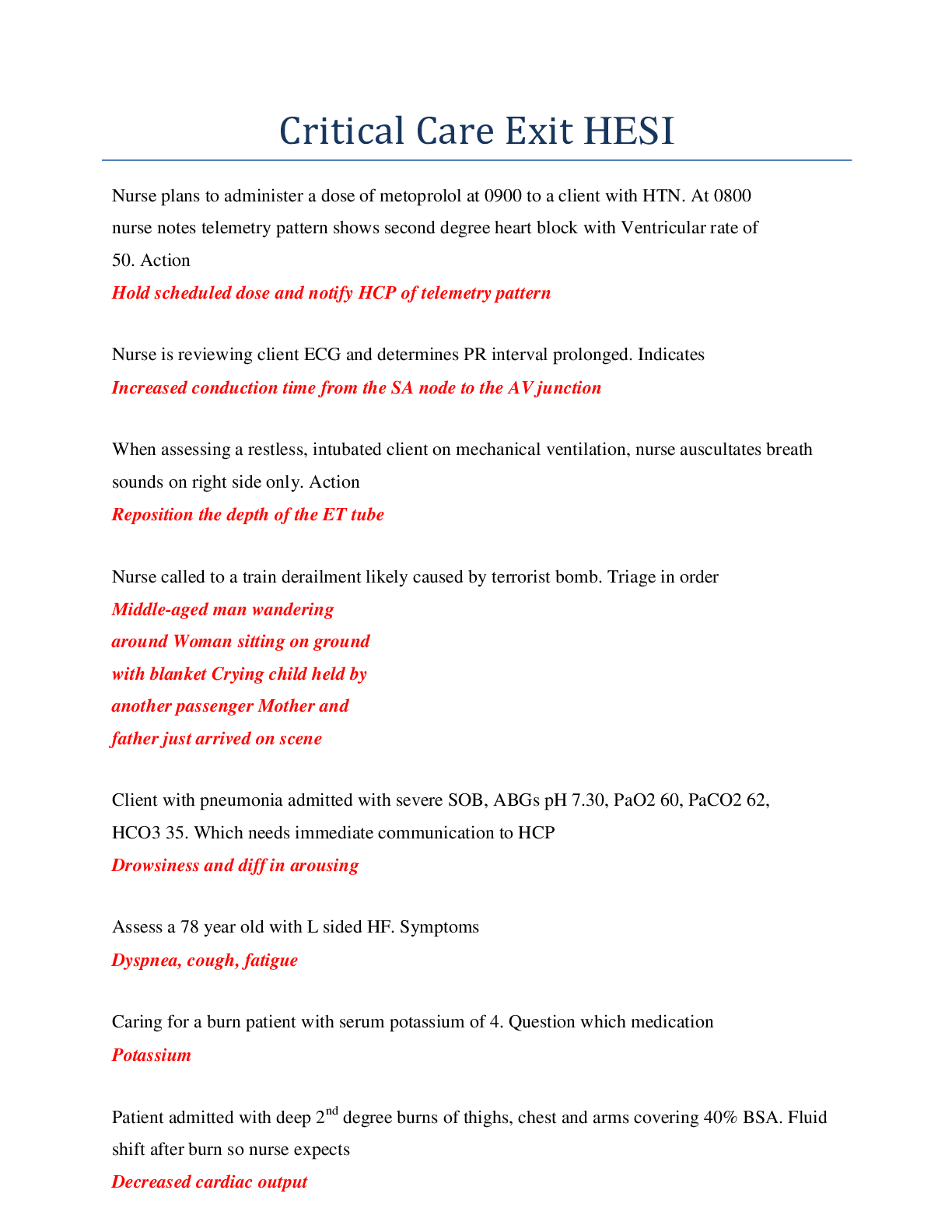
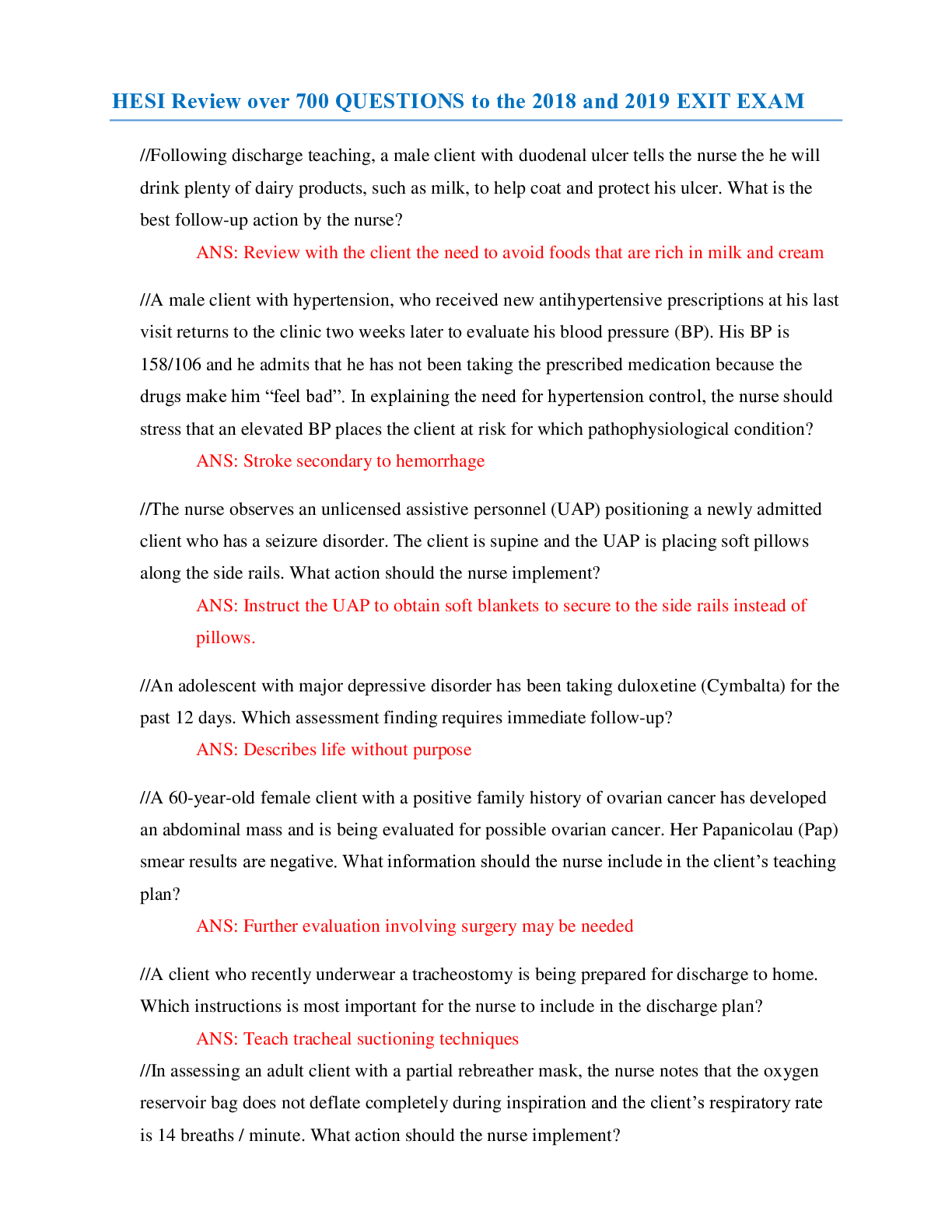
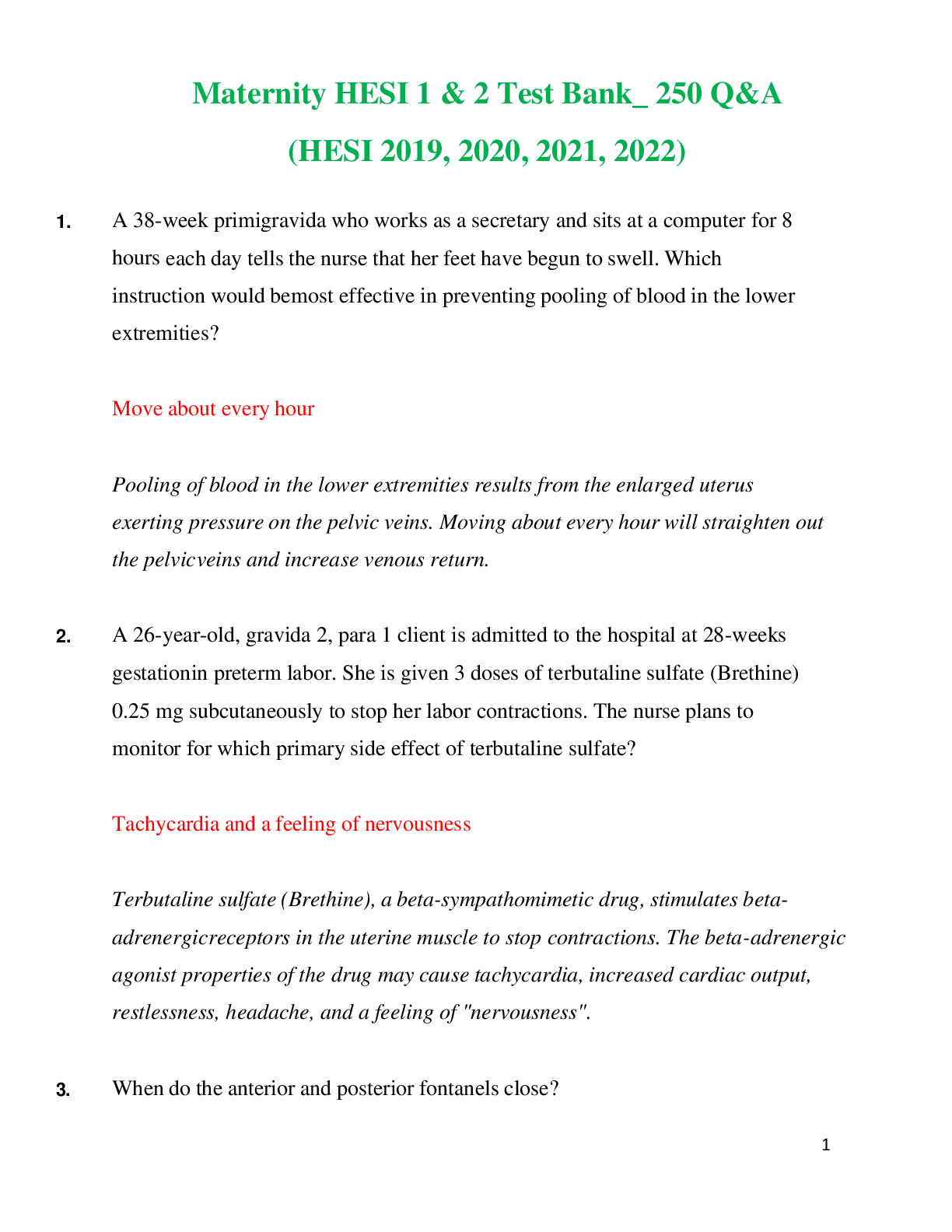
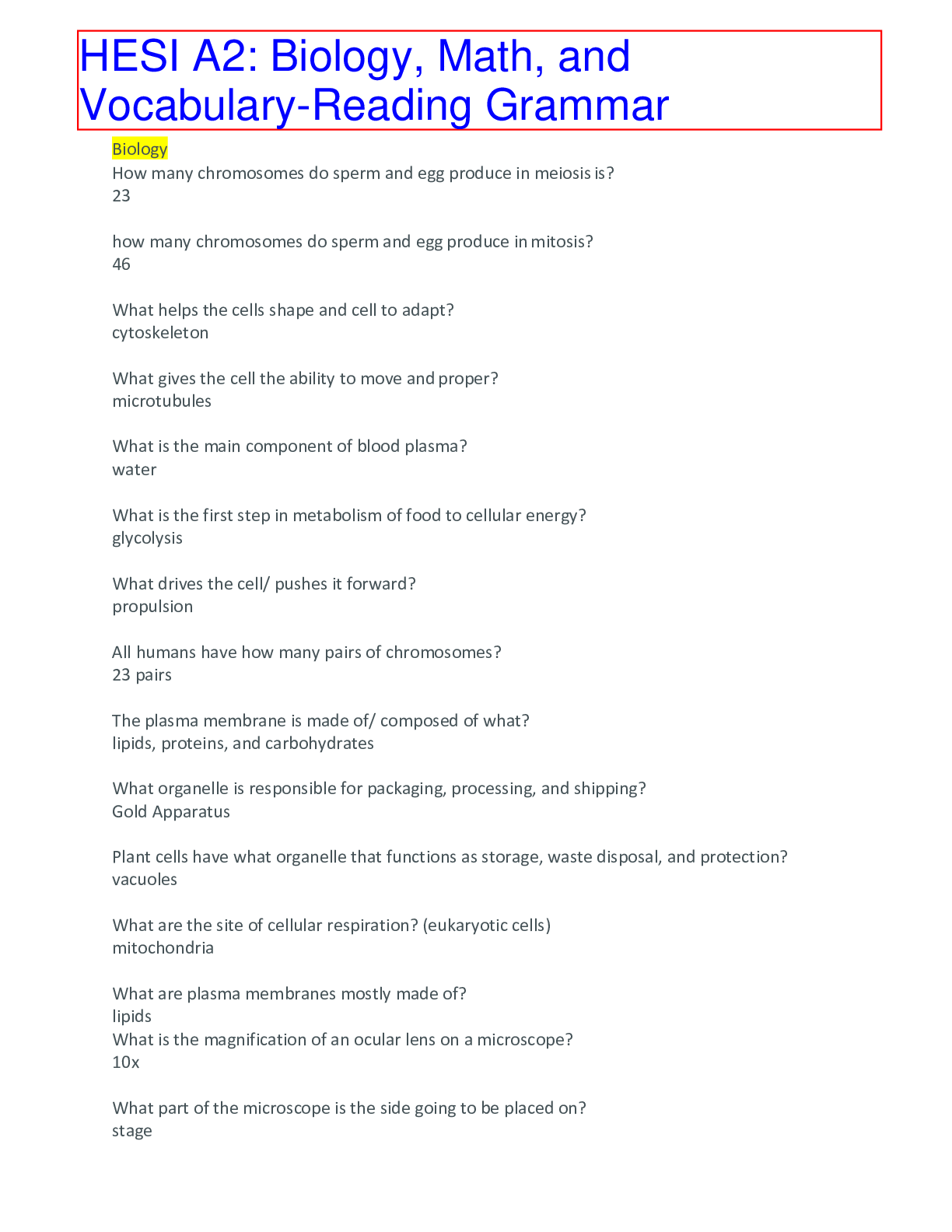
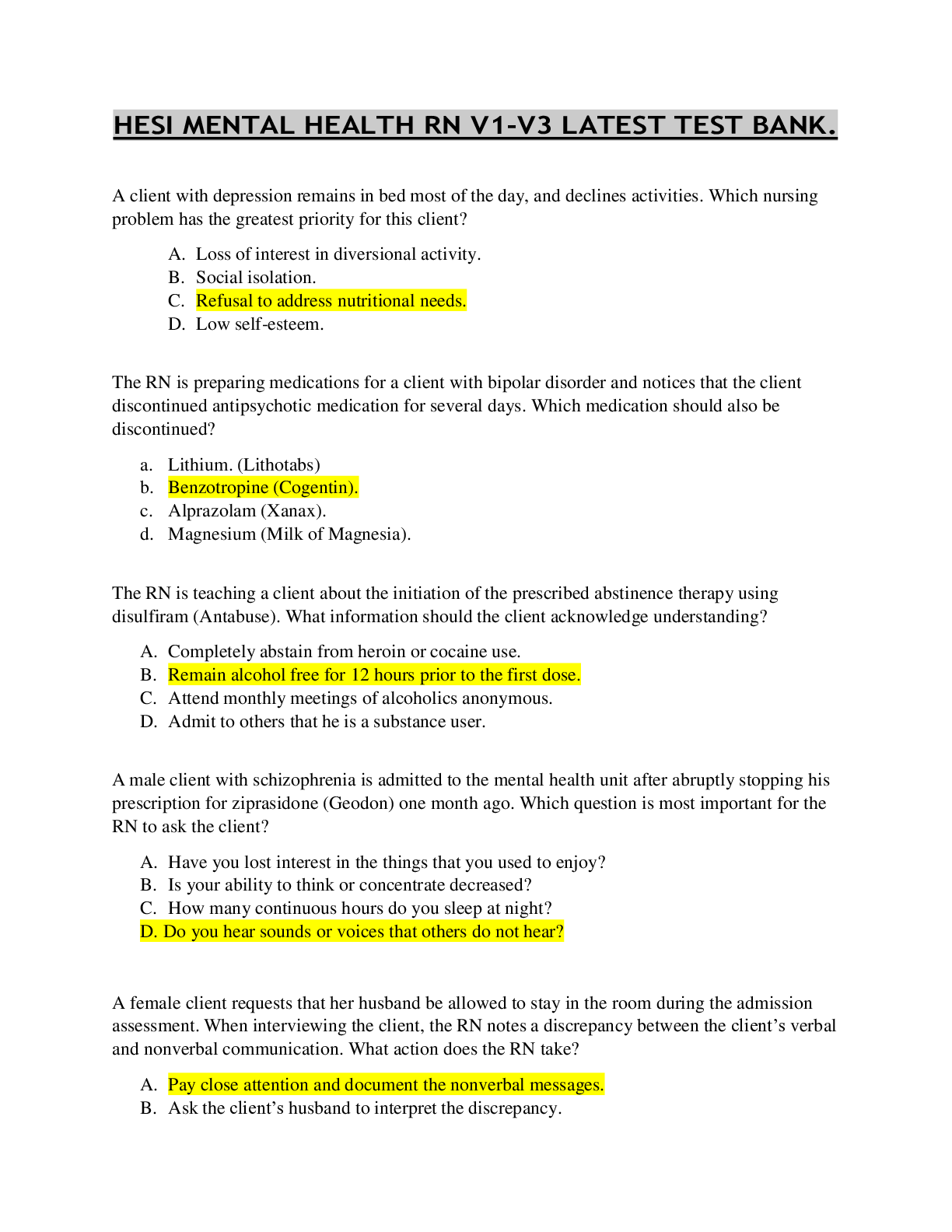
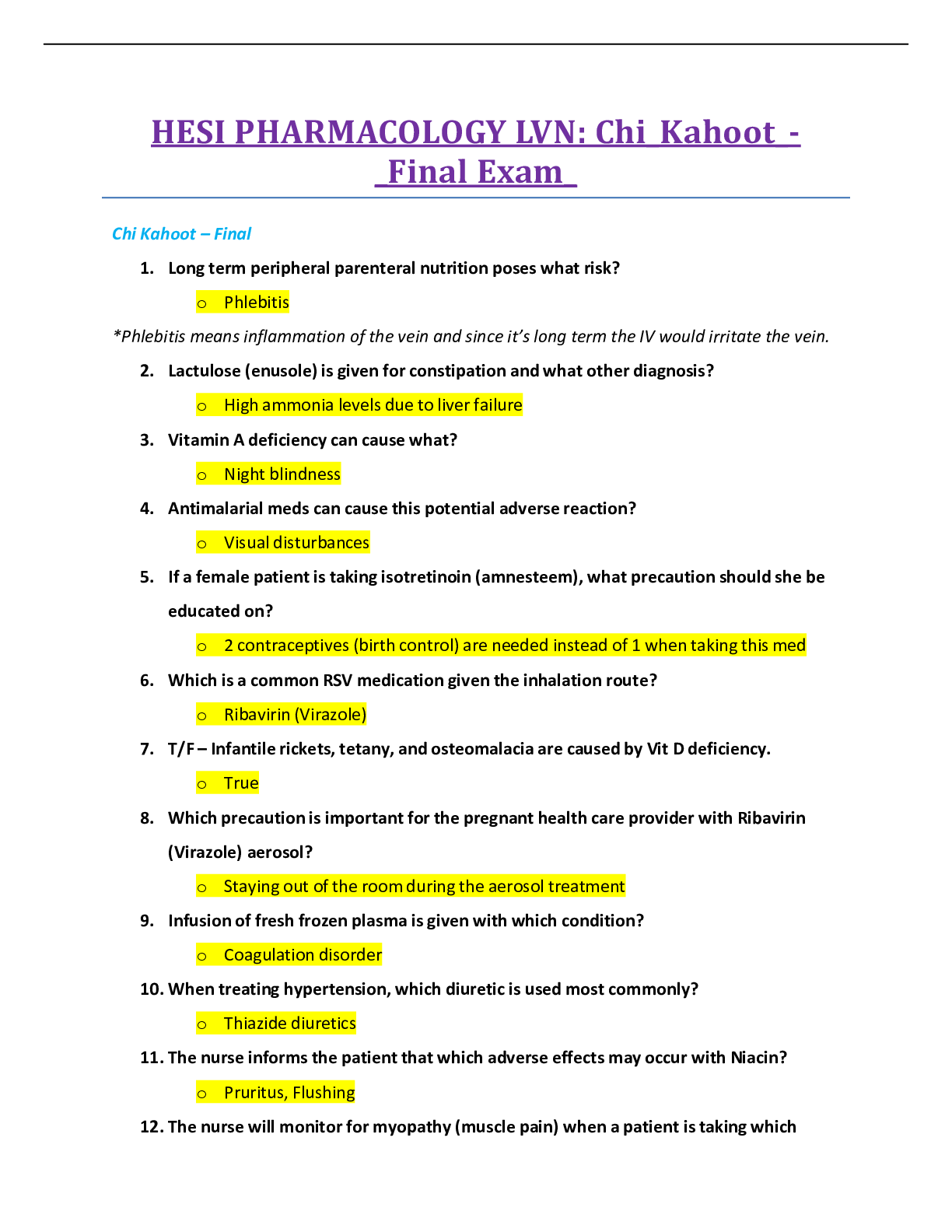
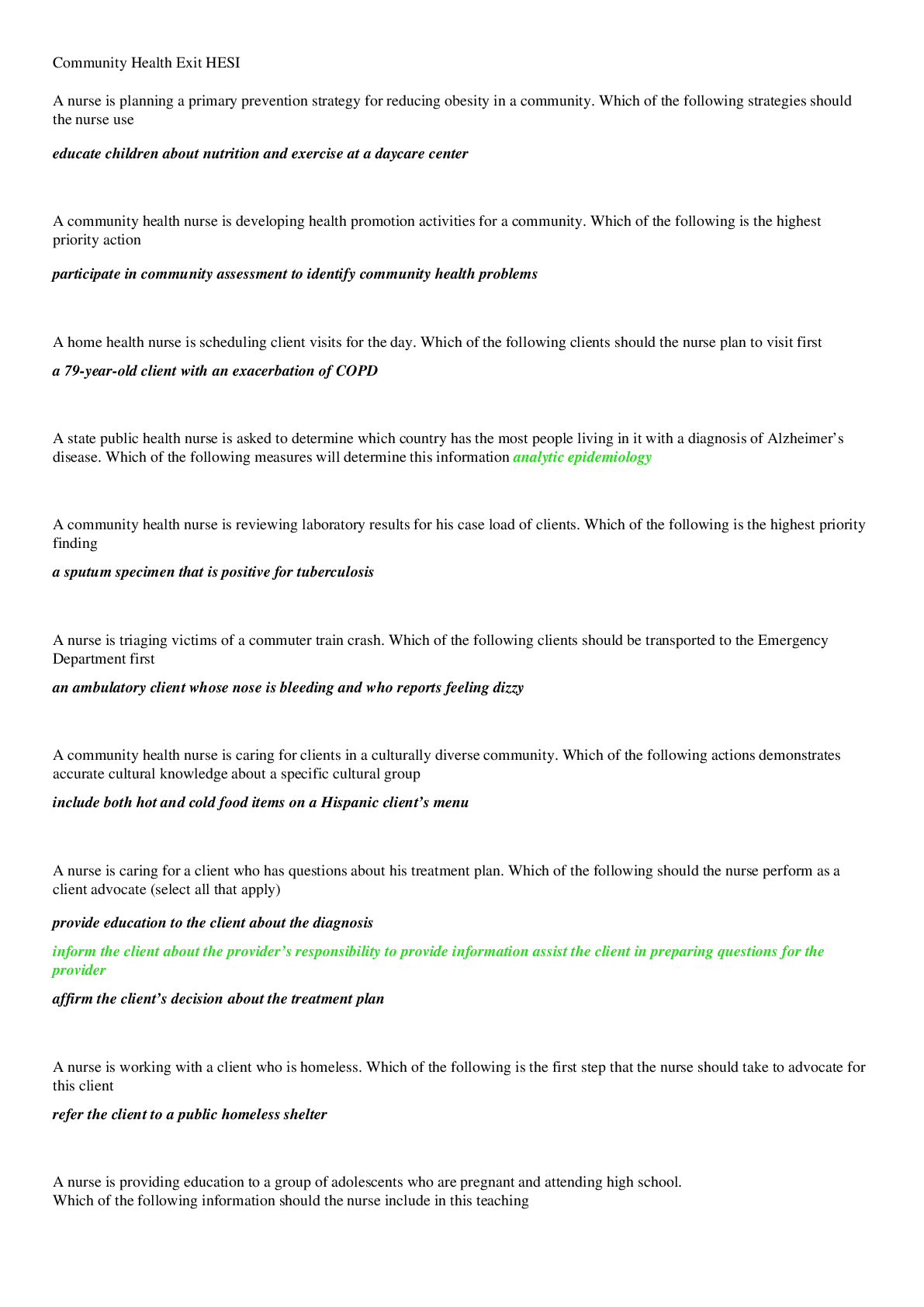
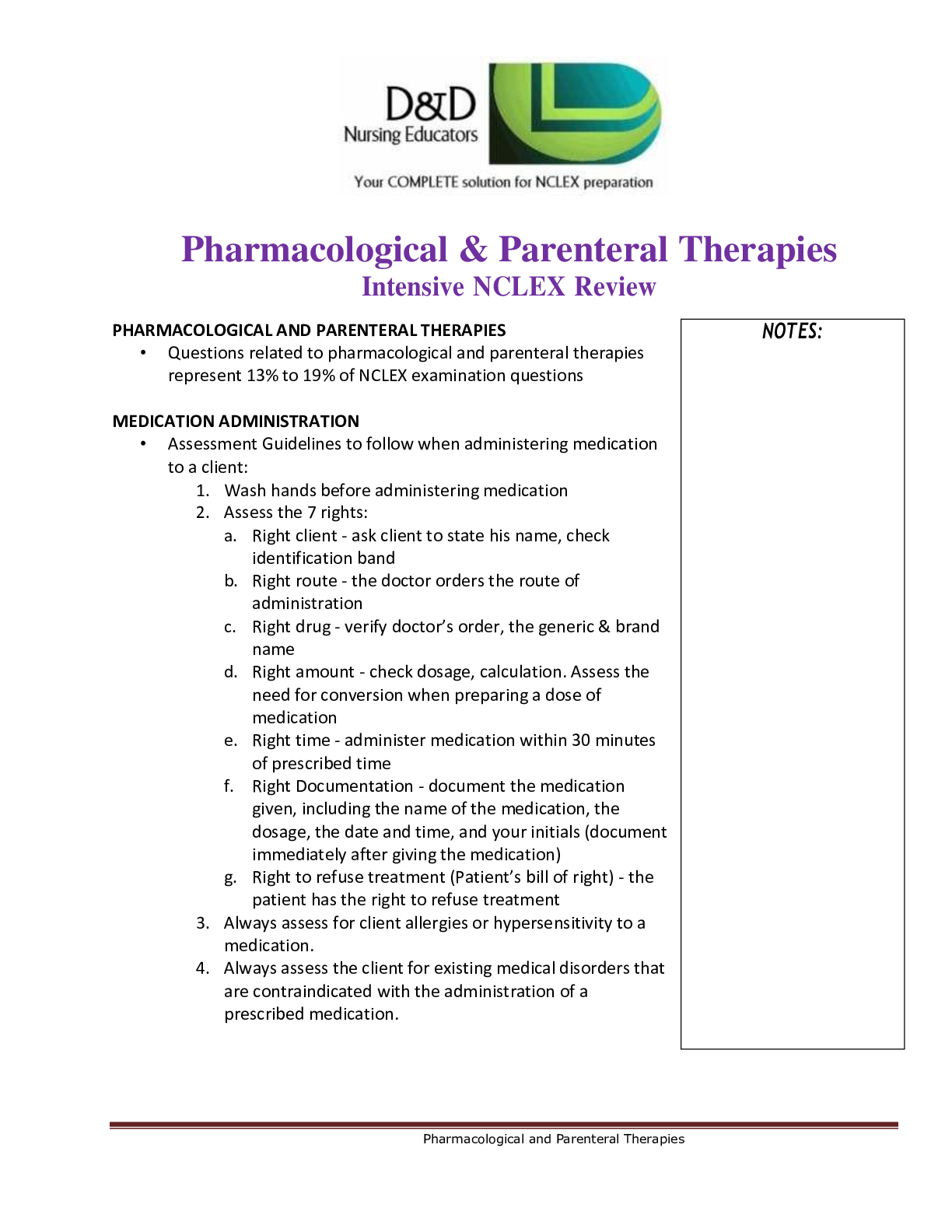
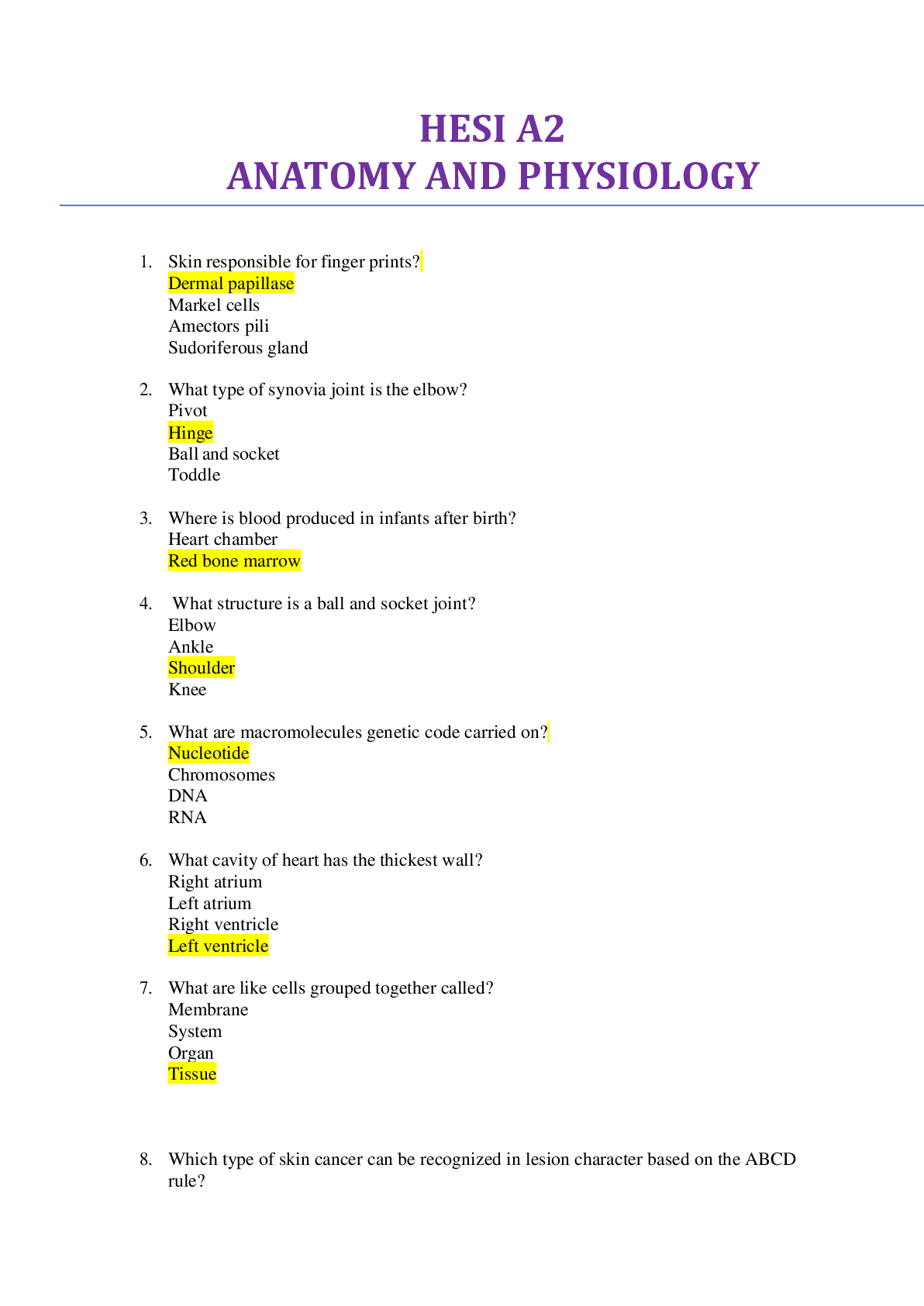
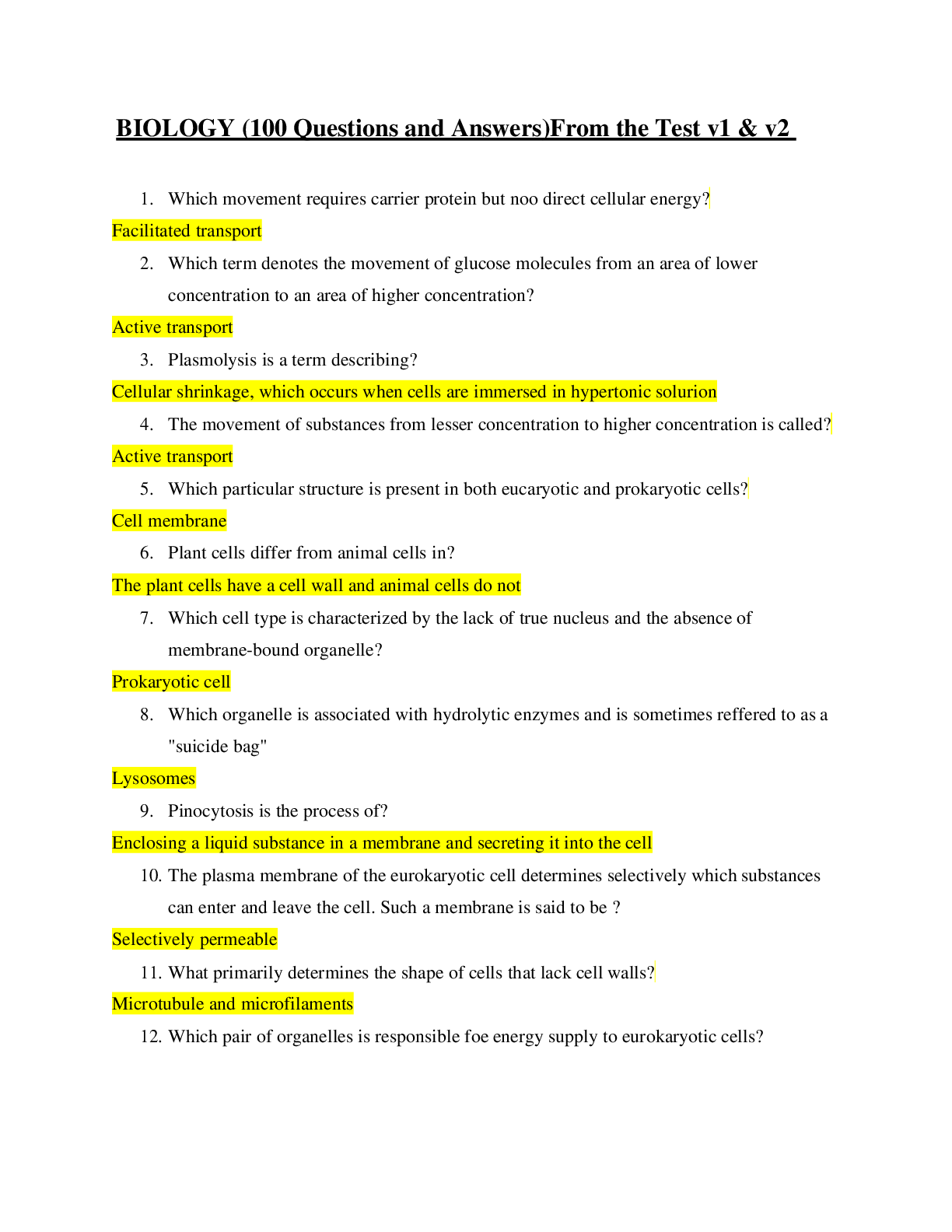
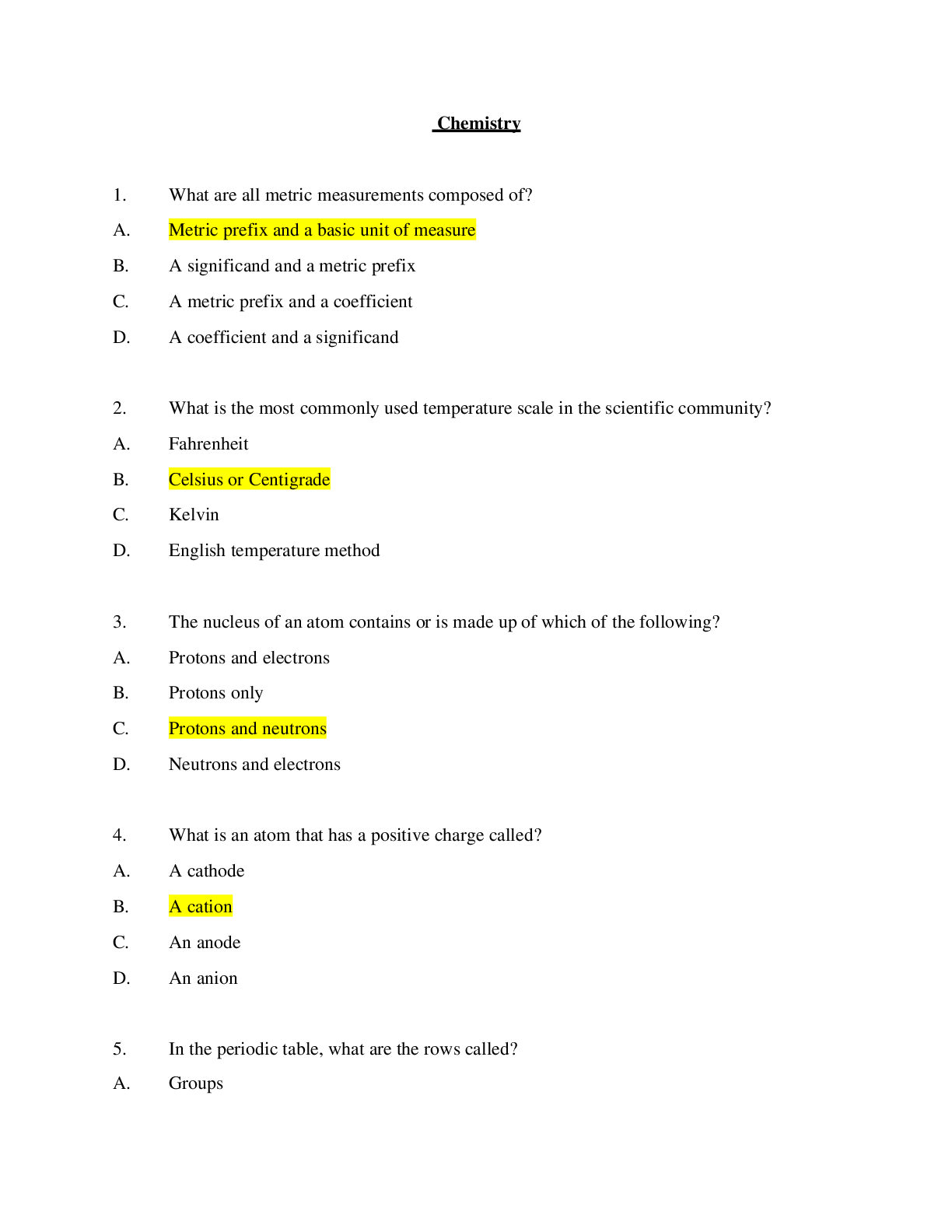
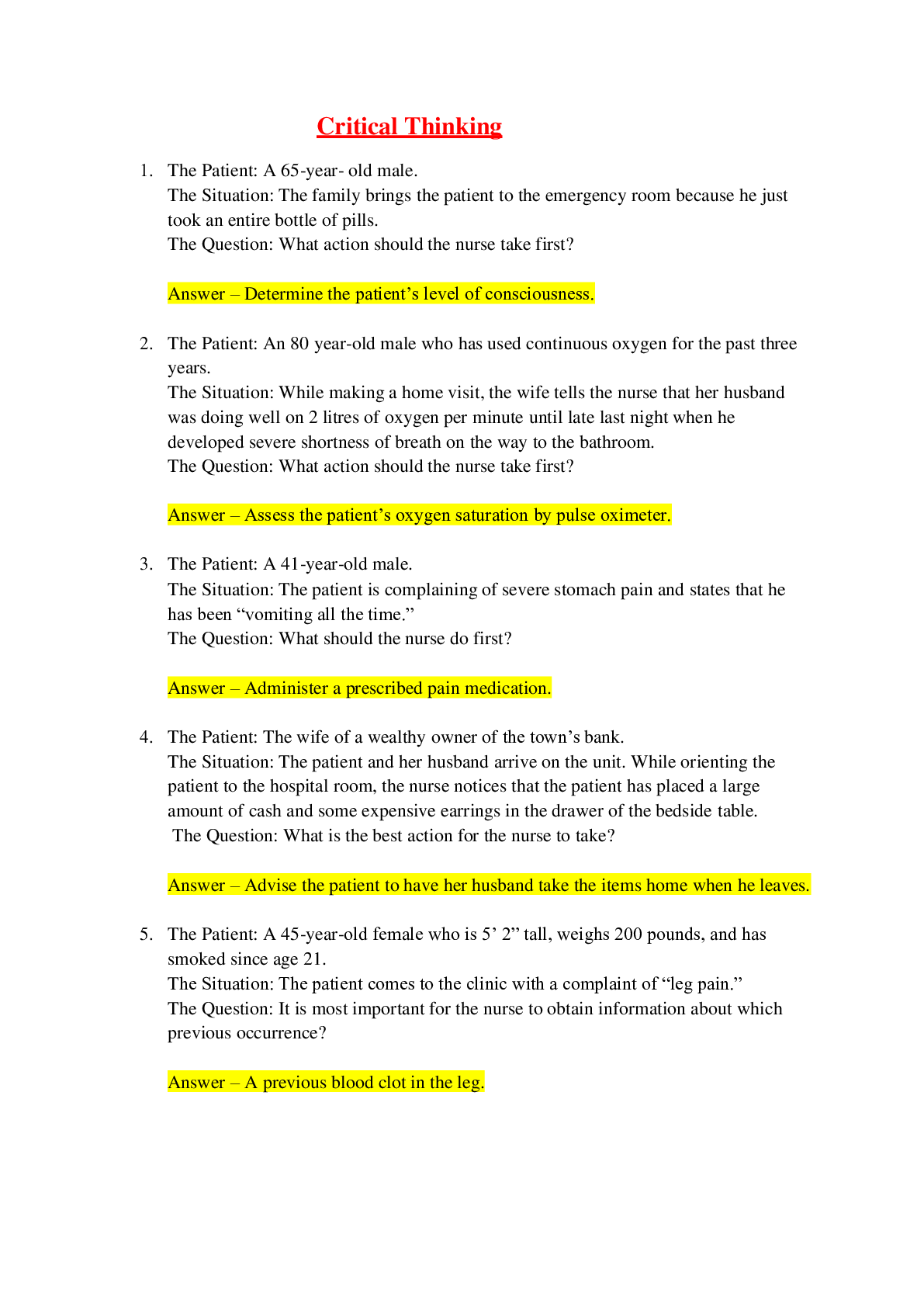
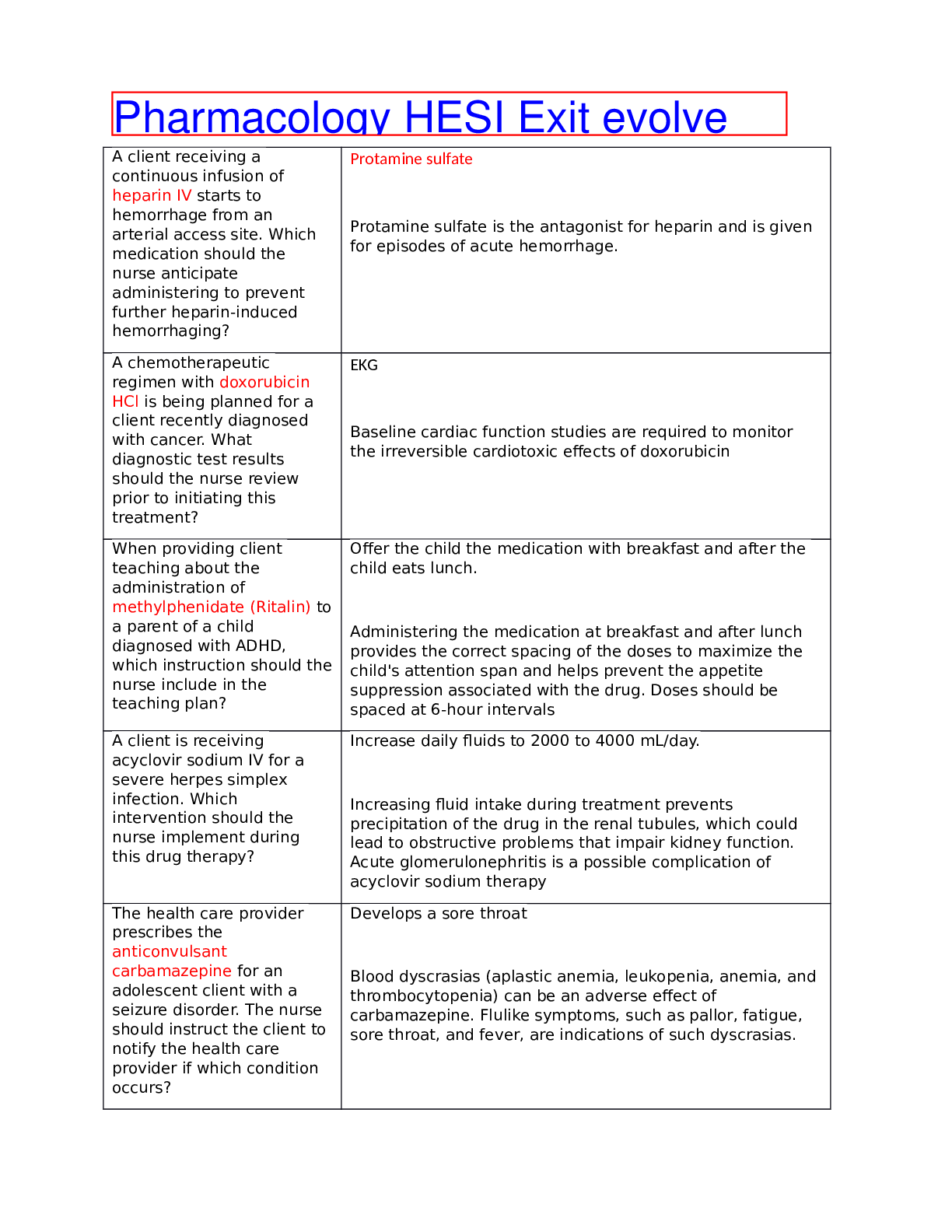
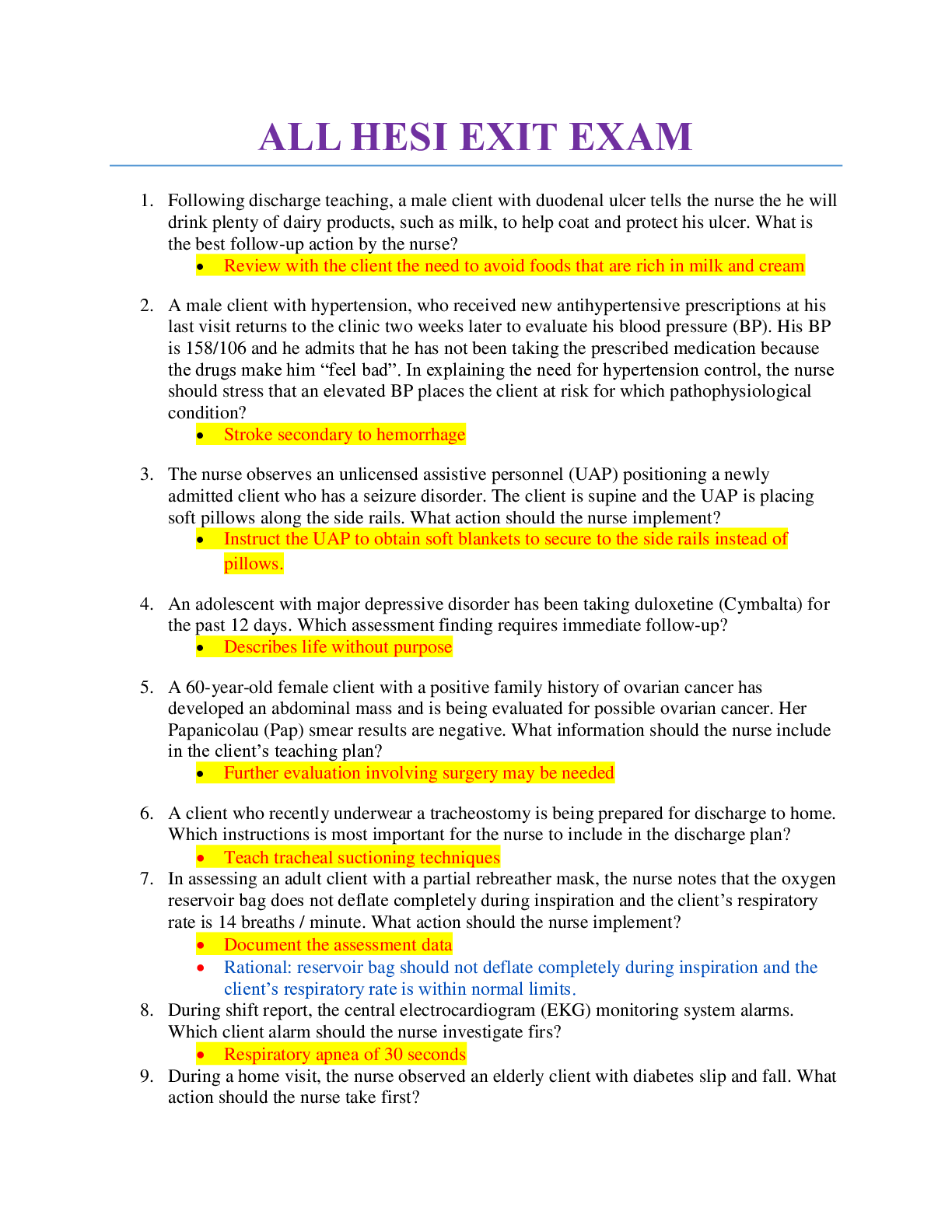

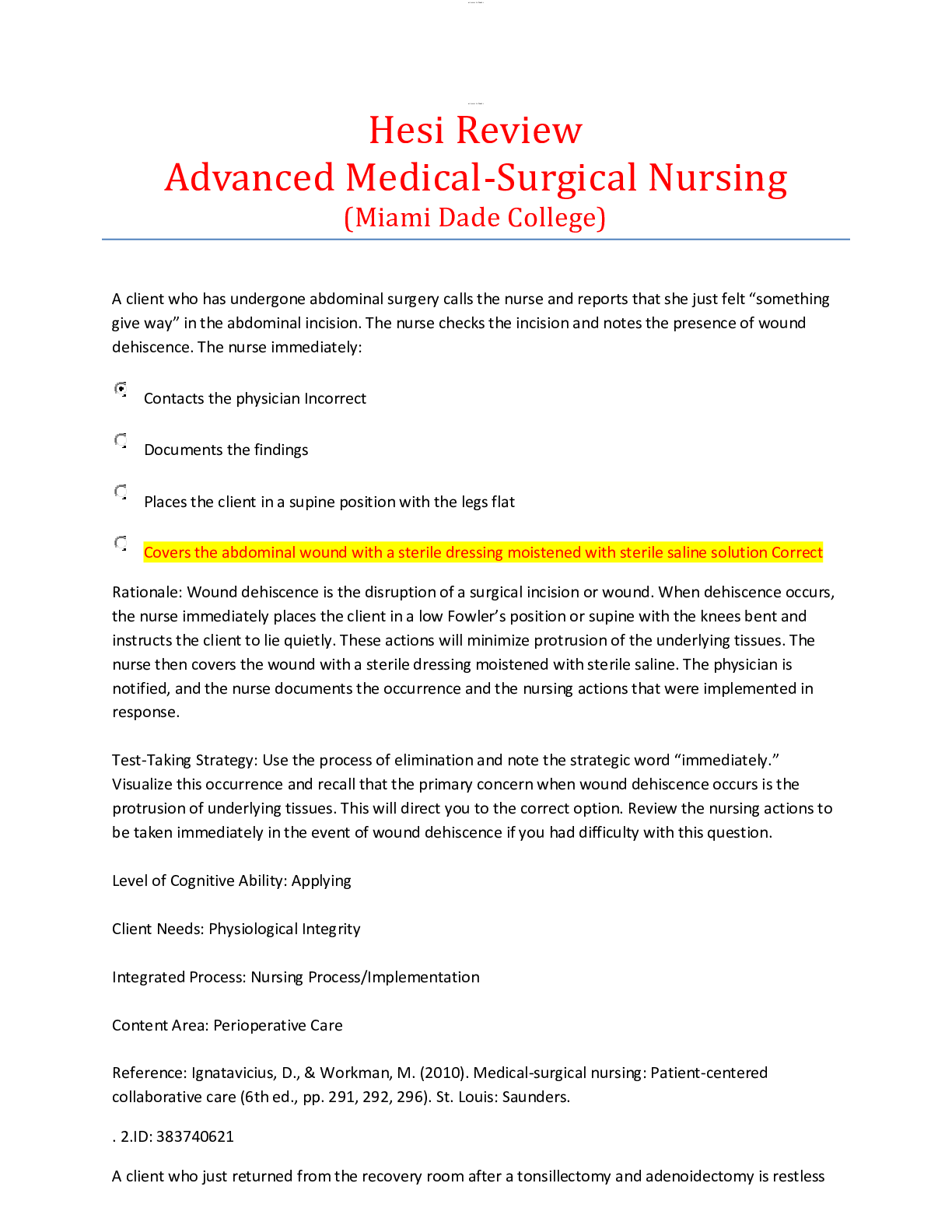

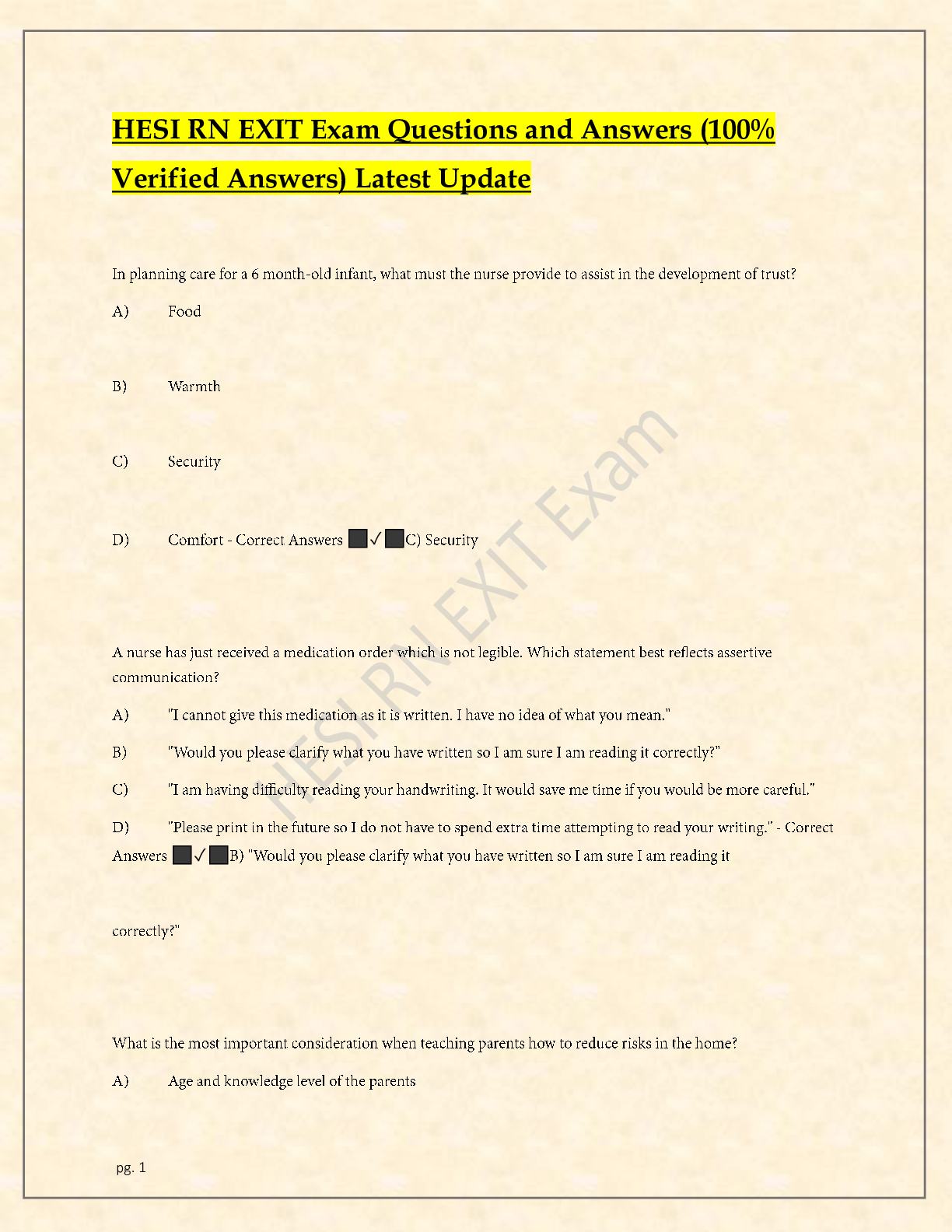
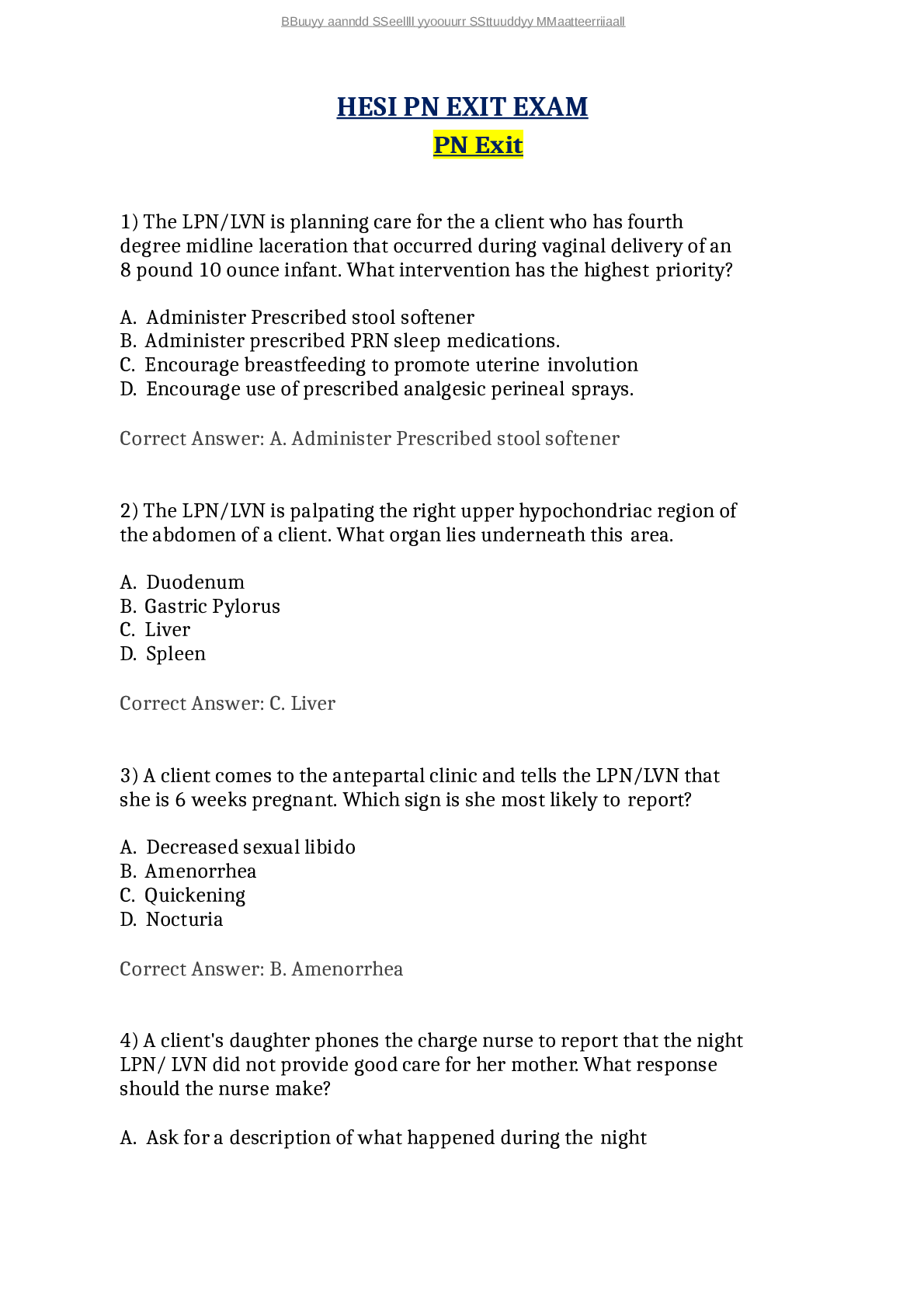

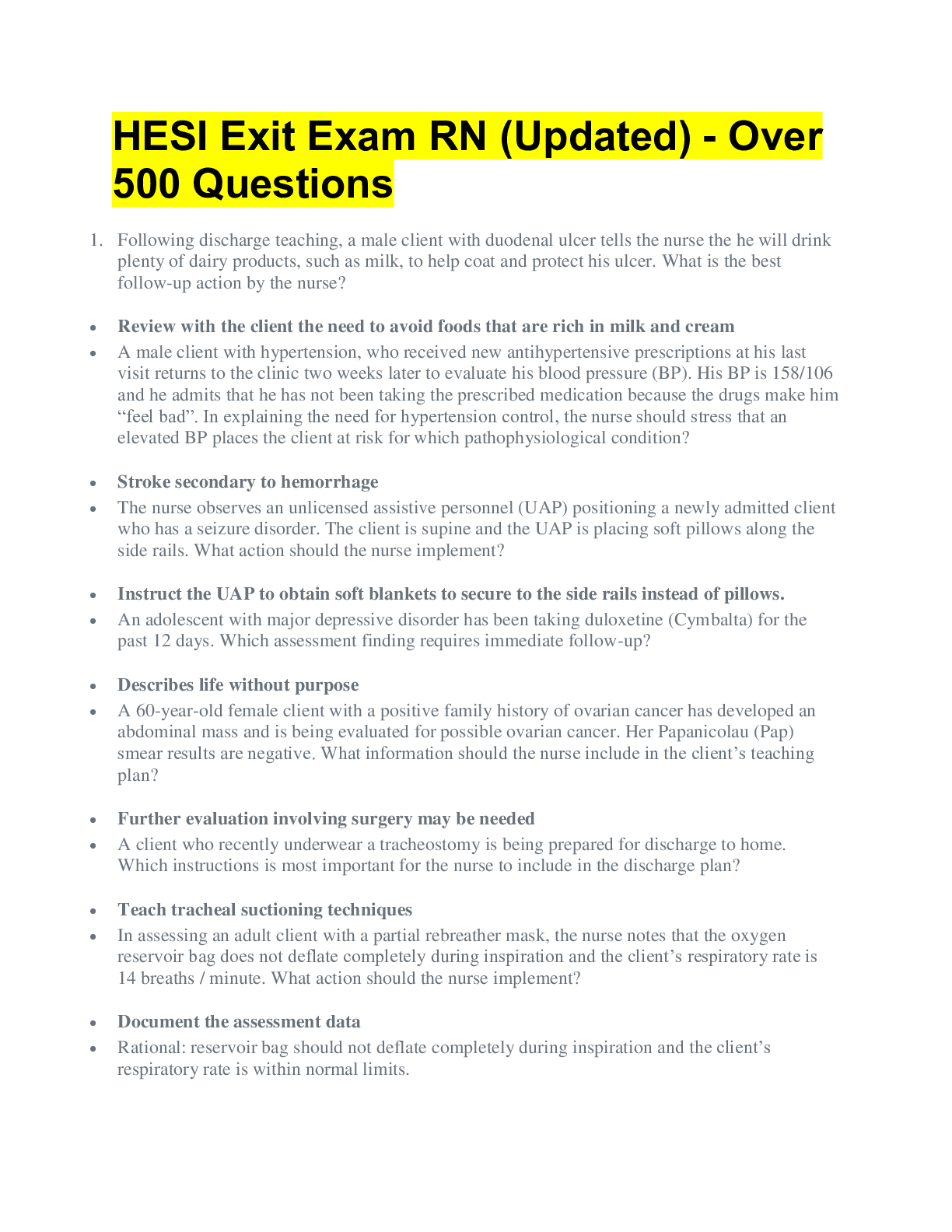
 (1).png)
